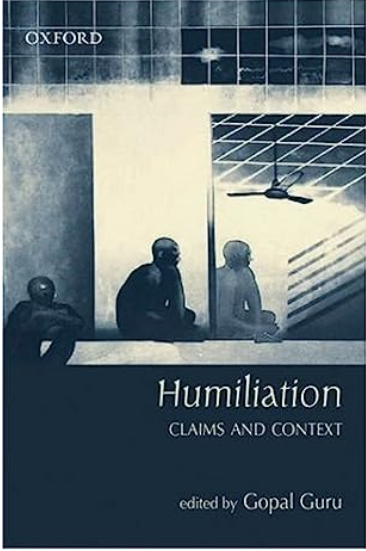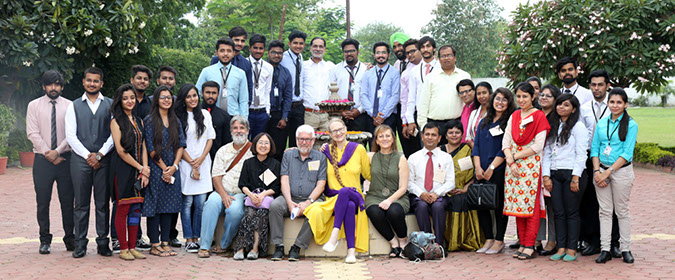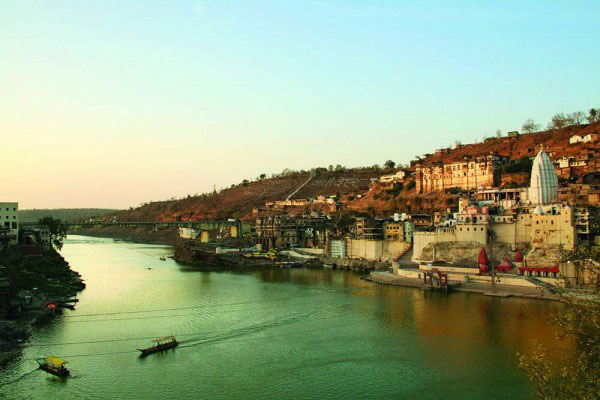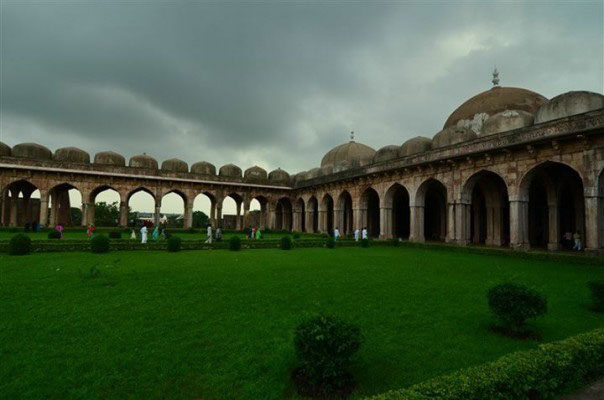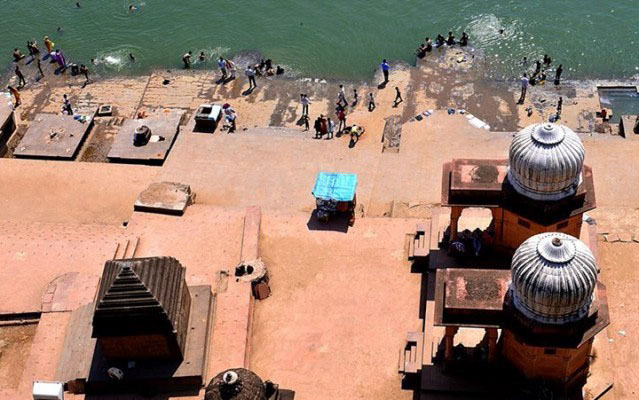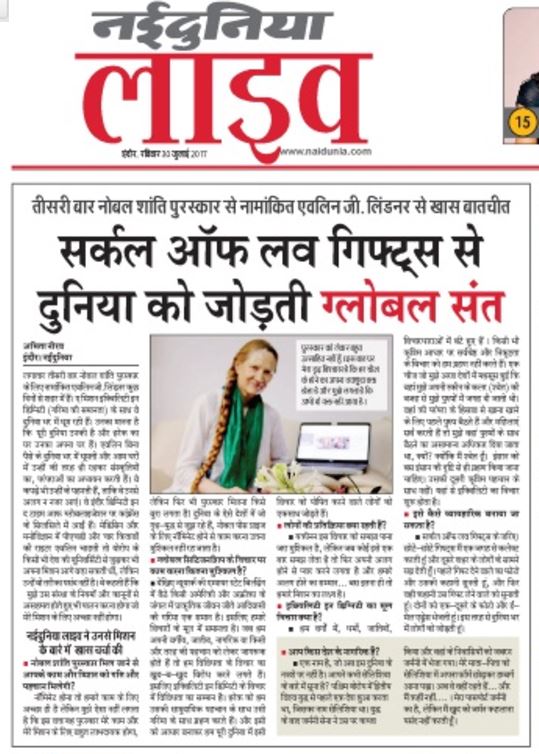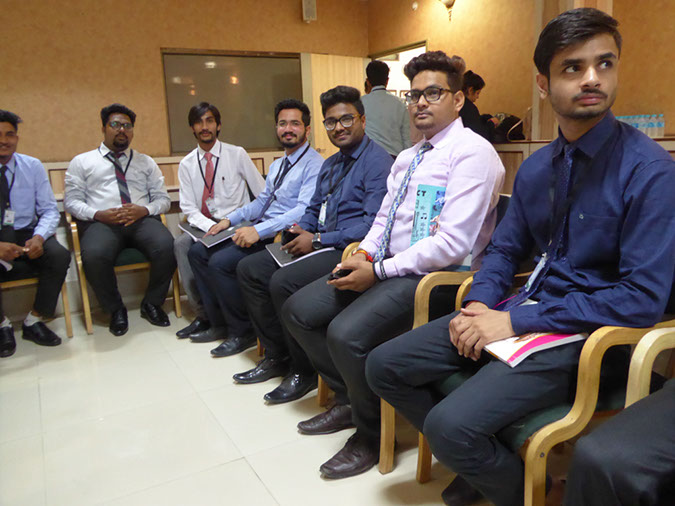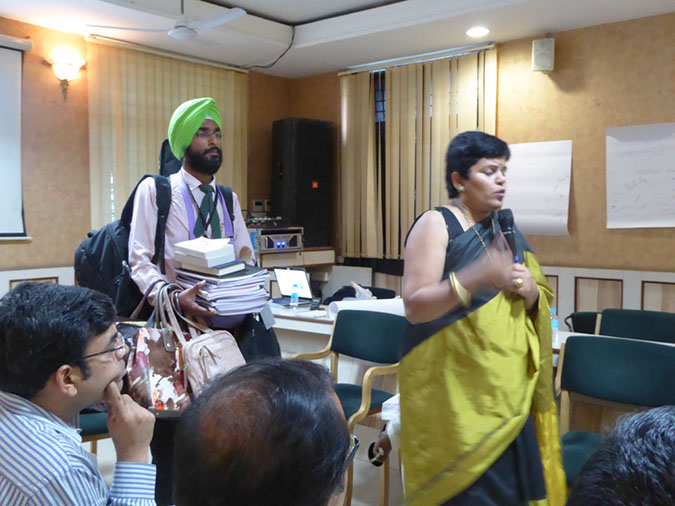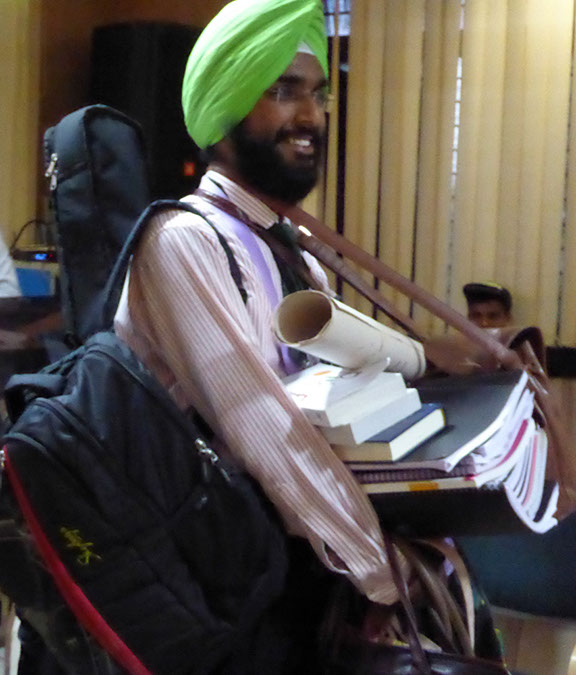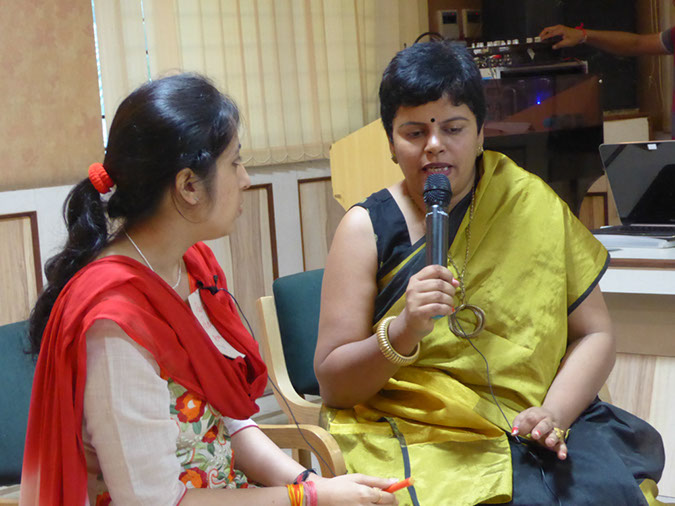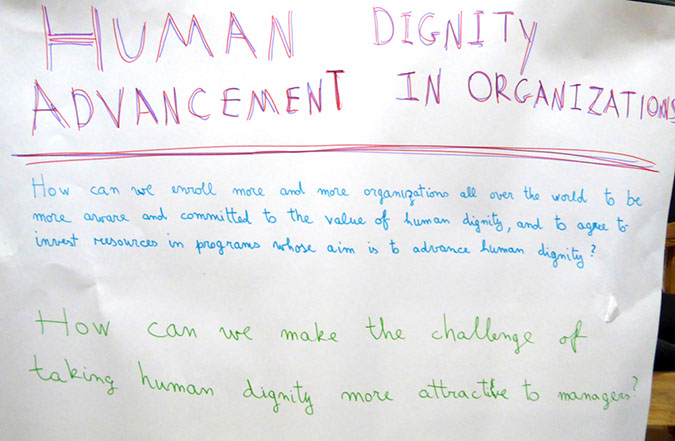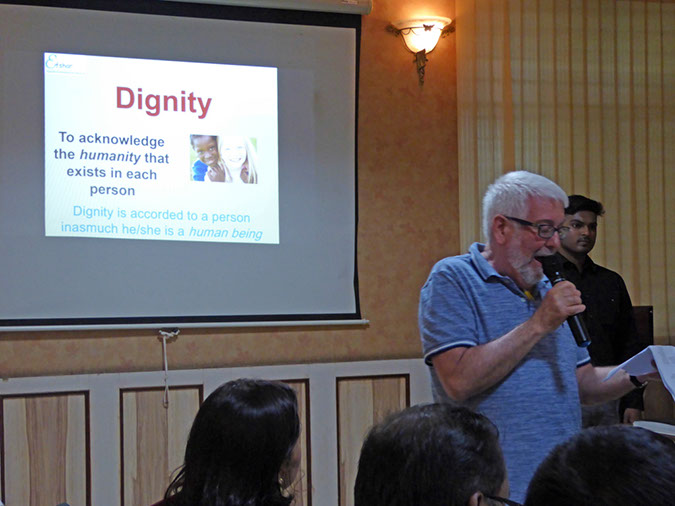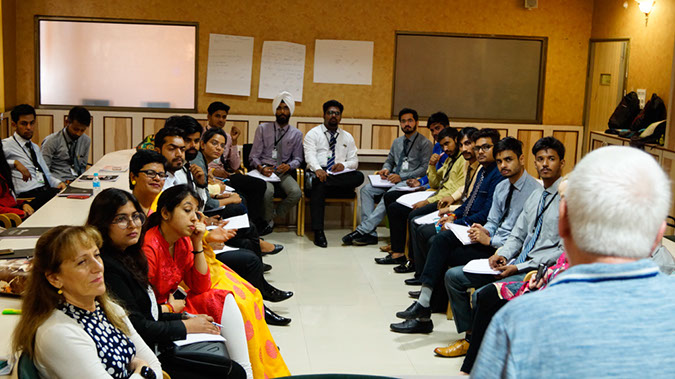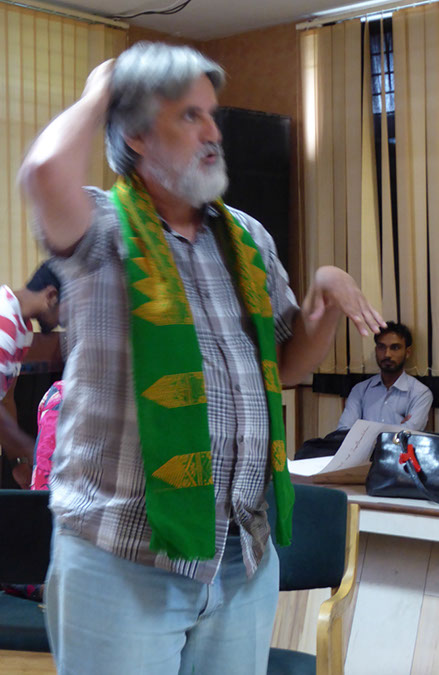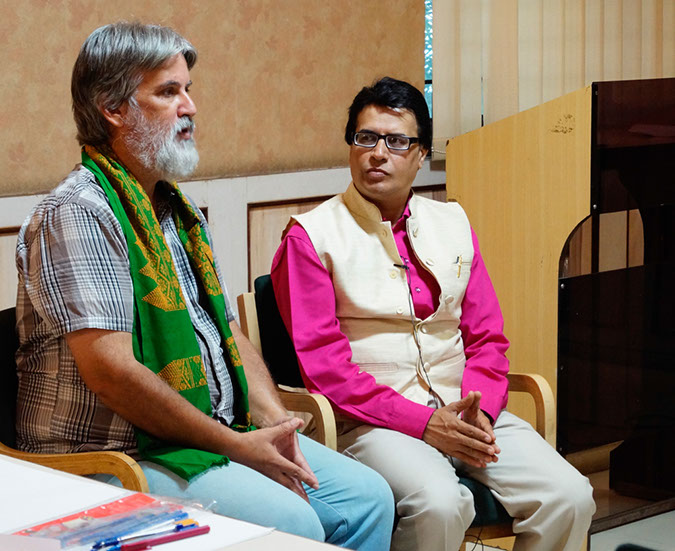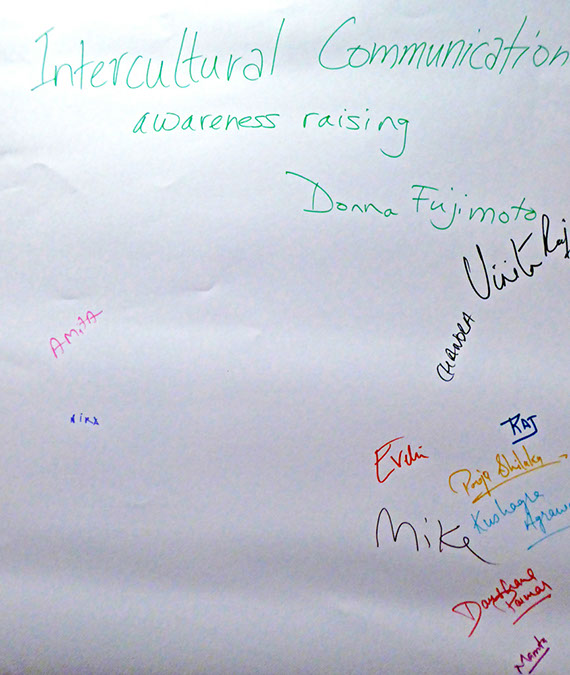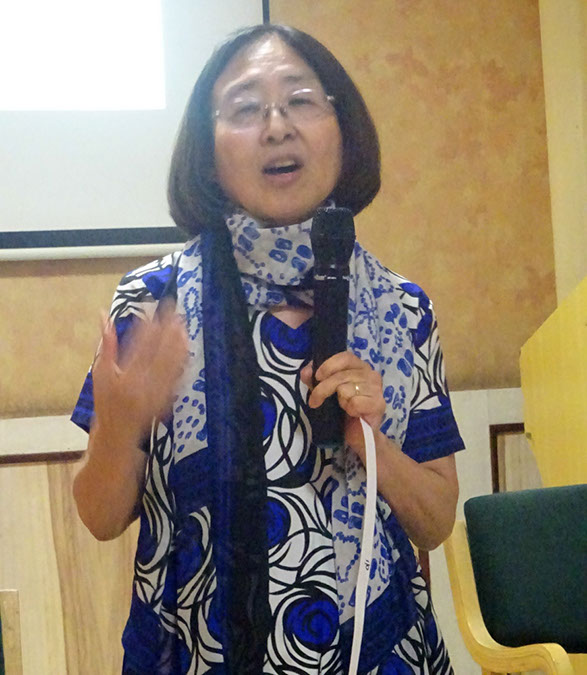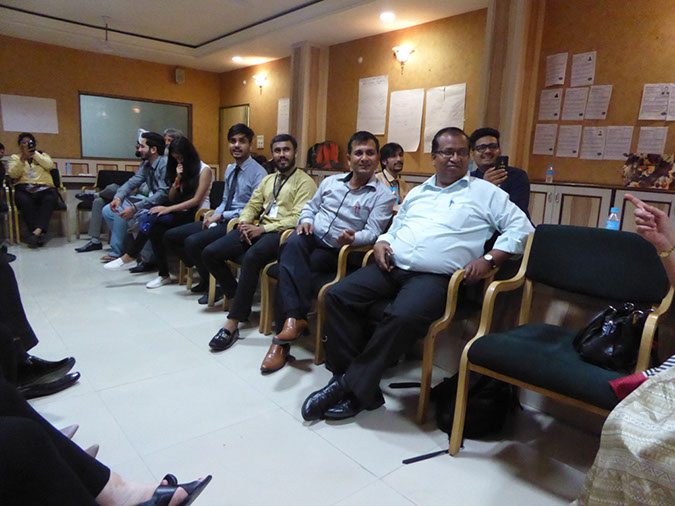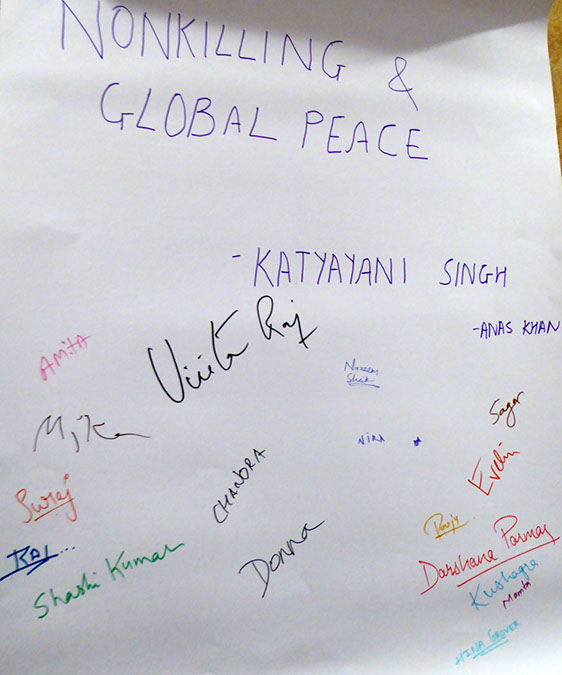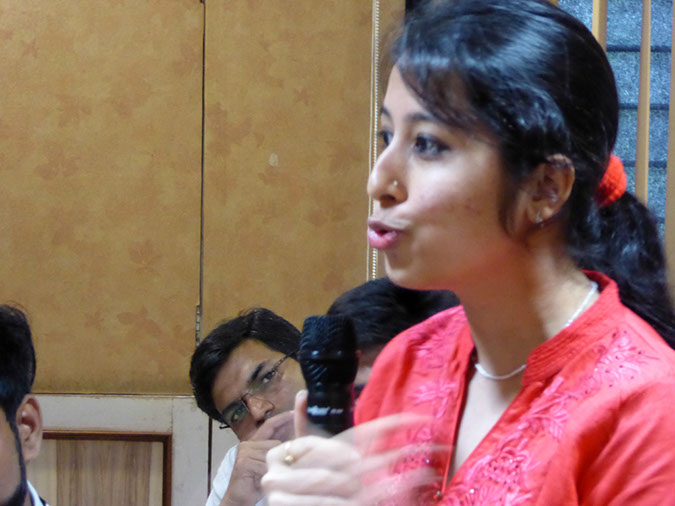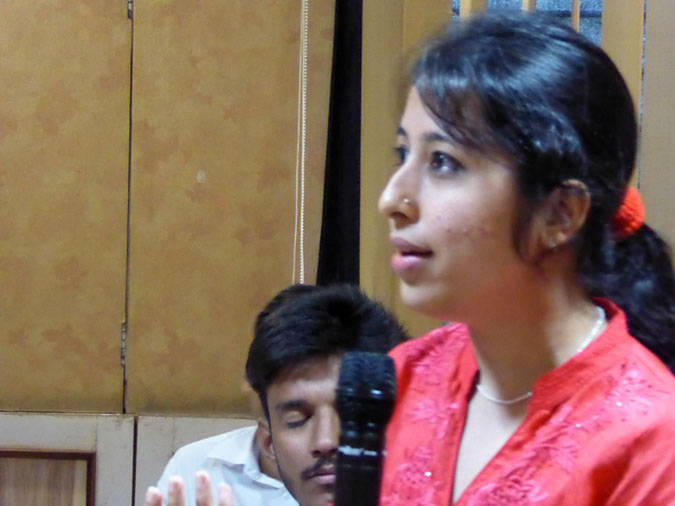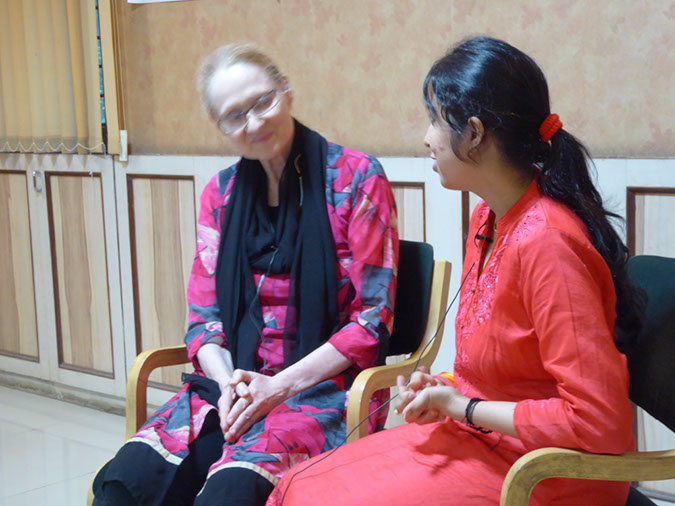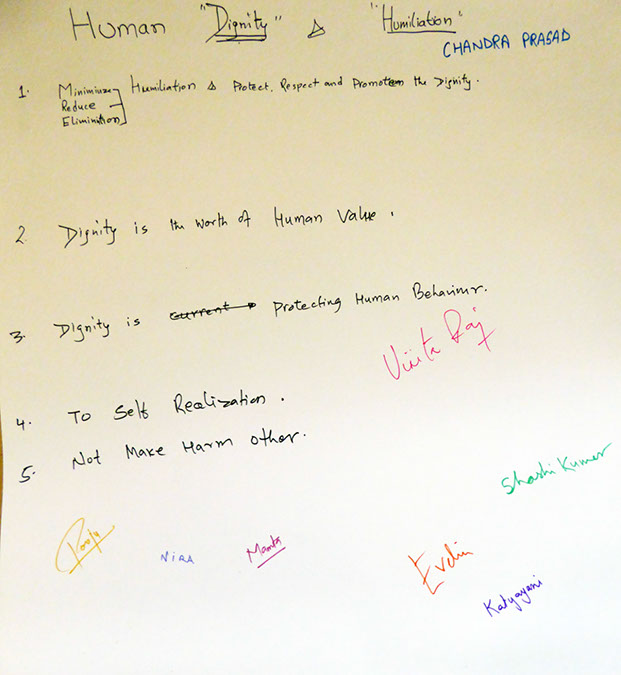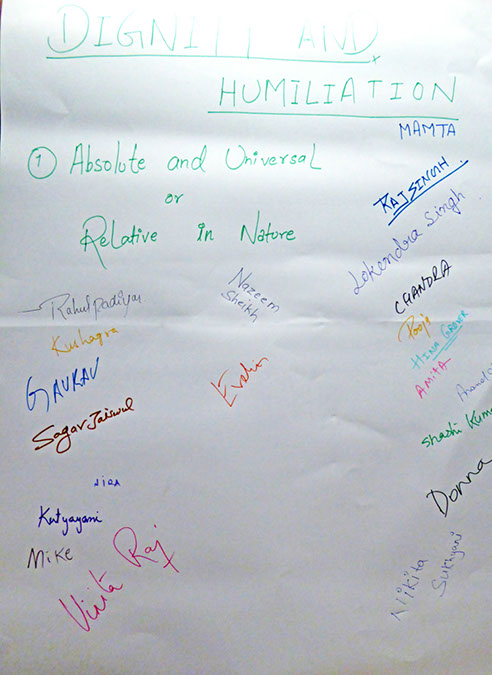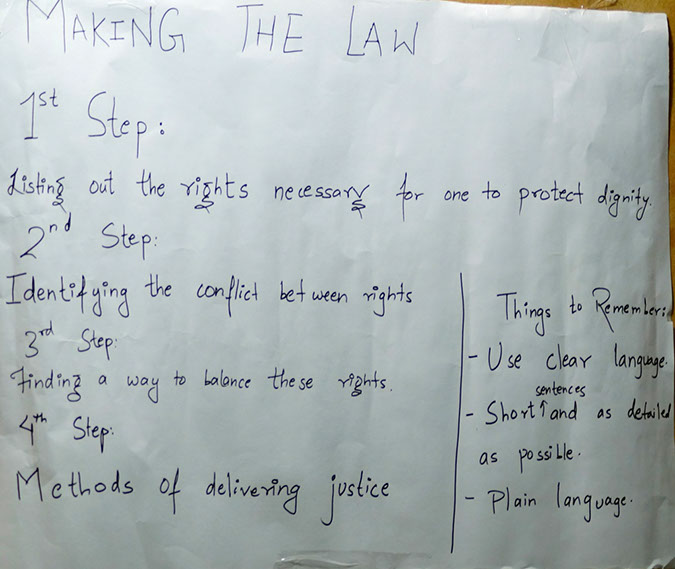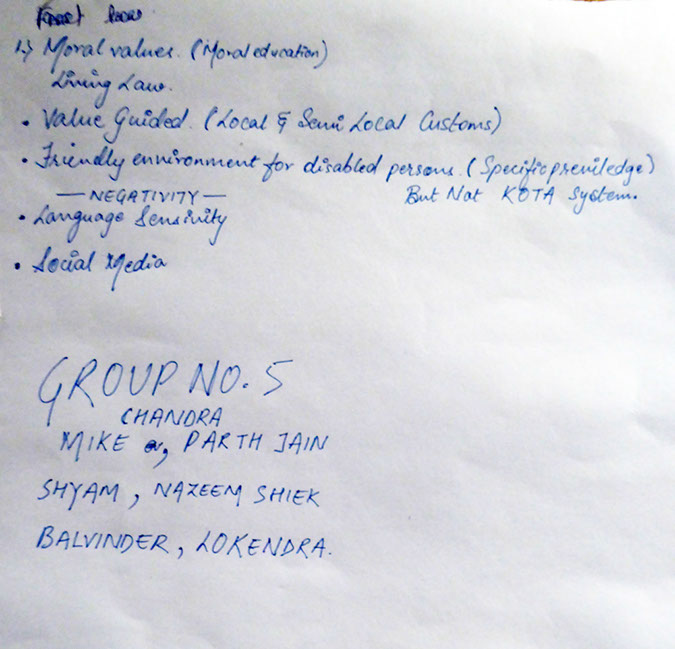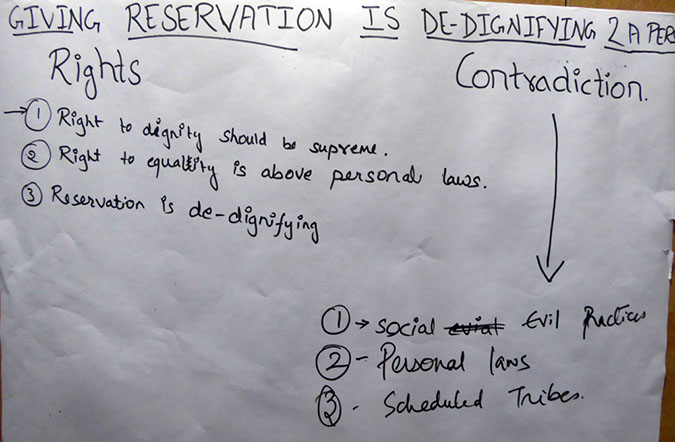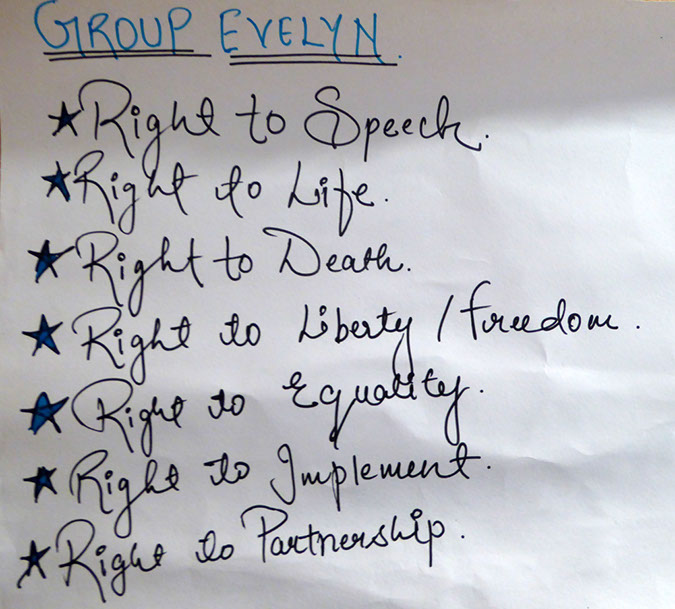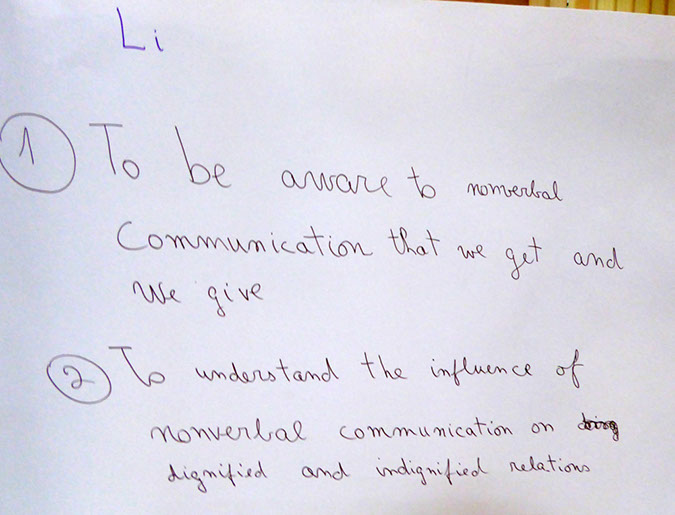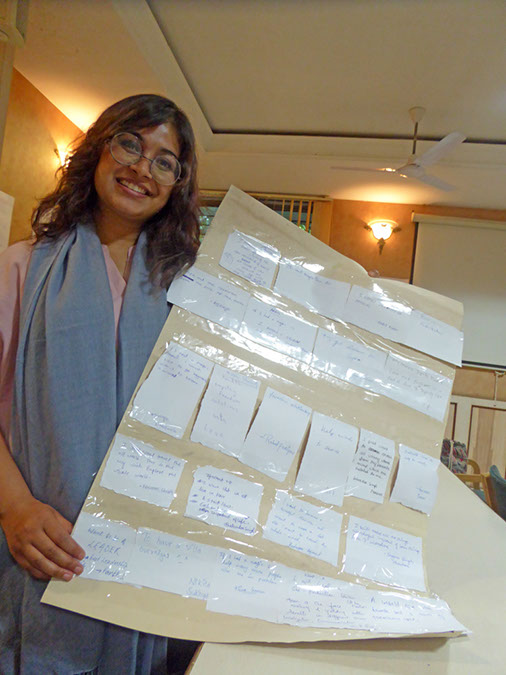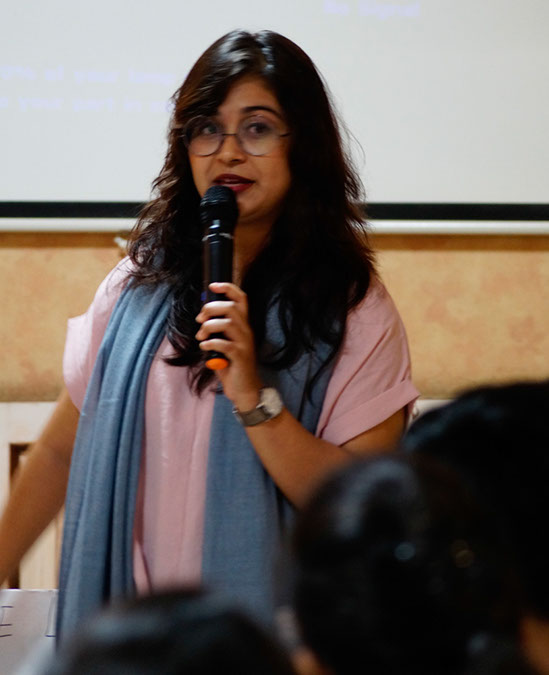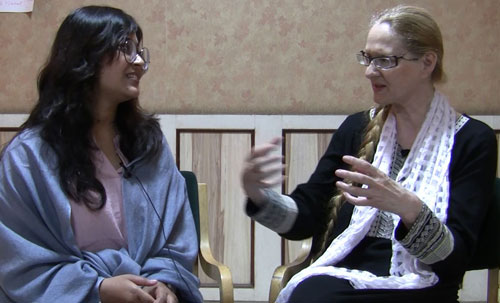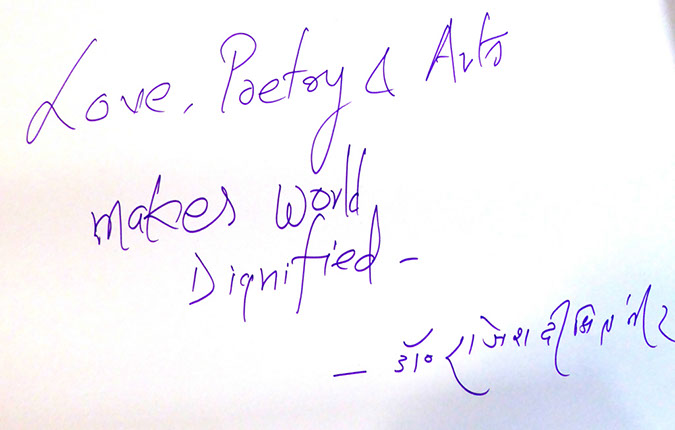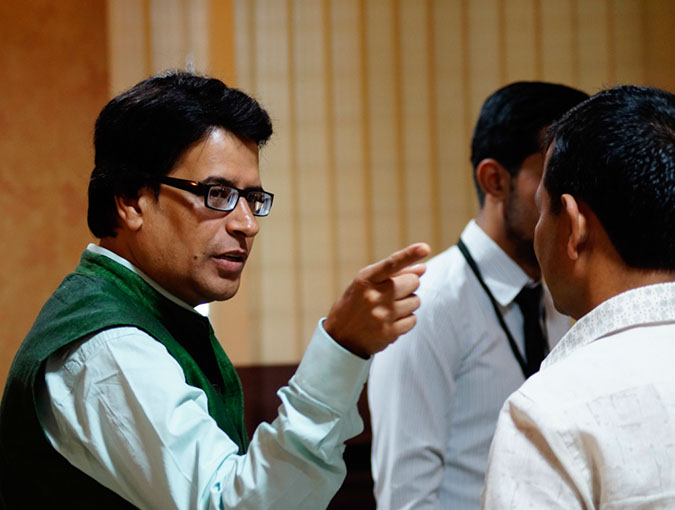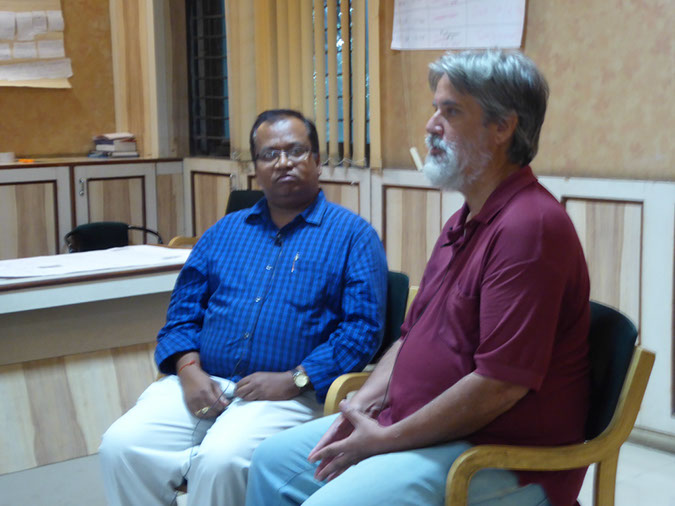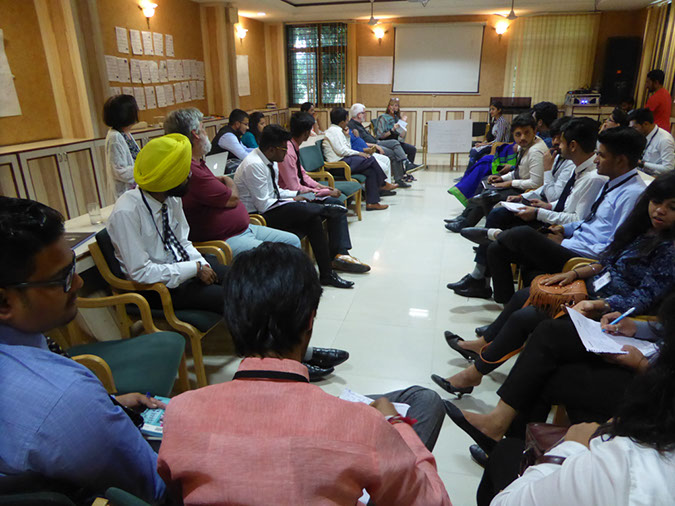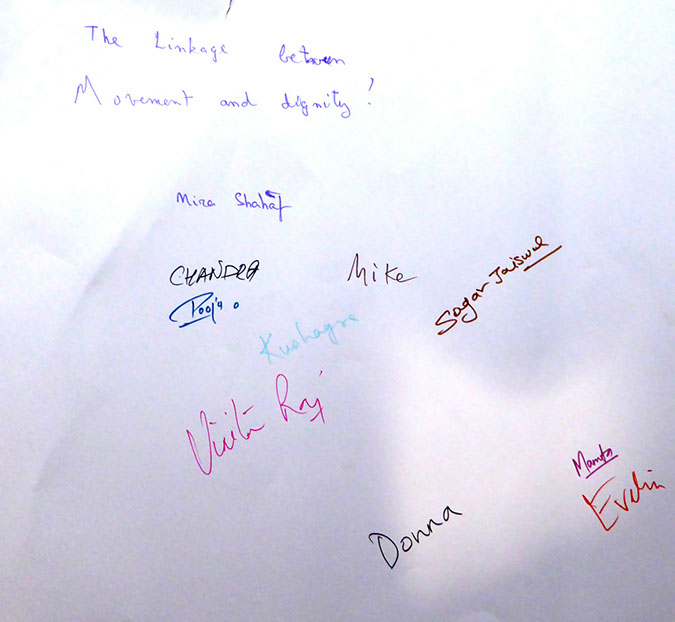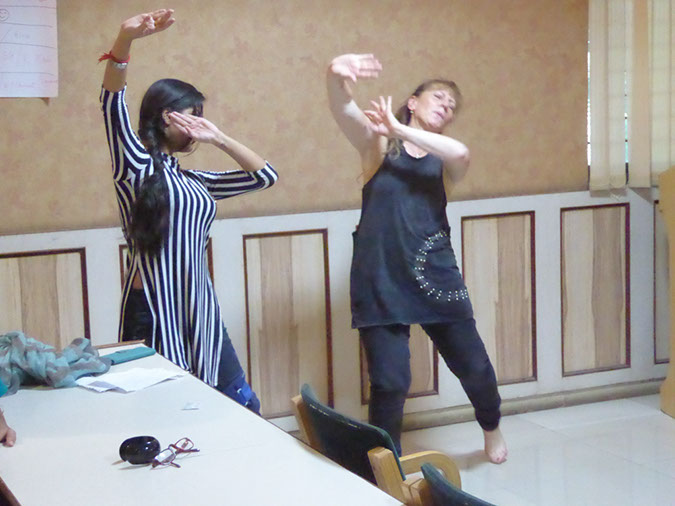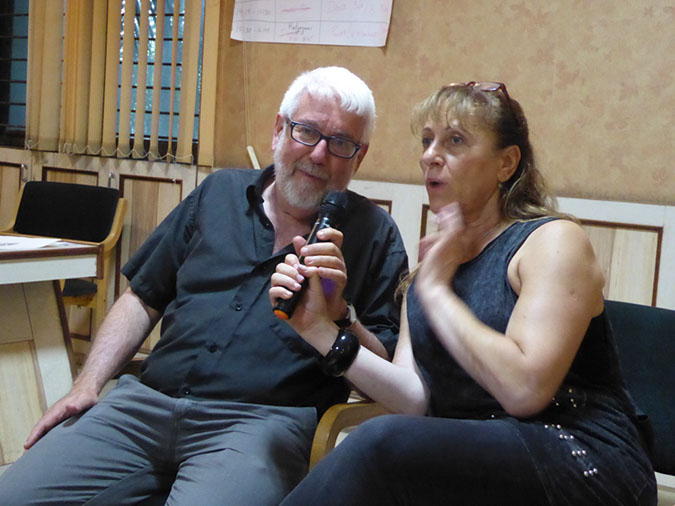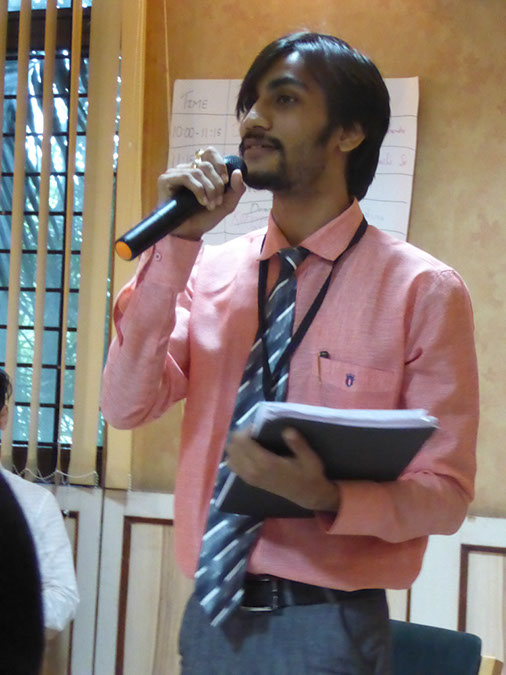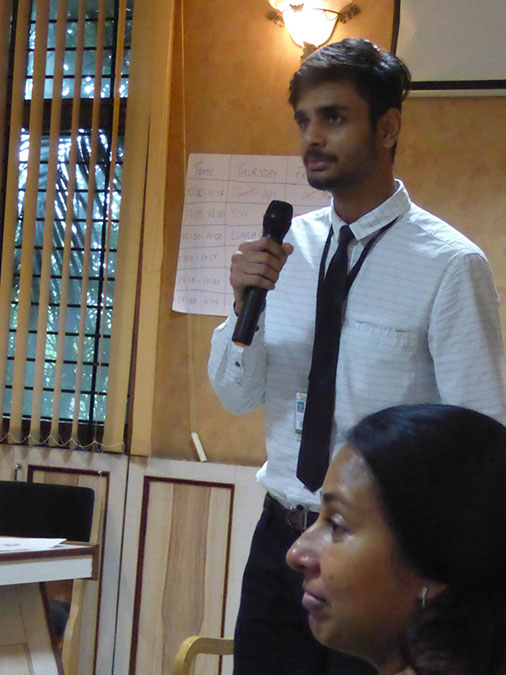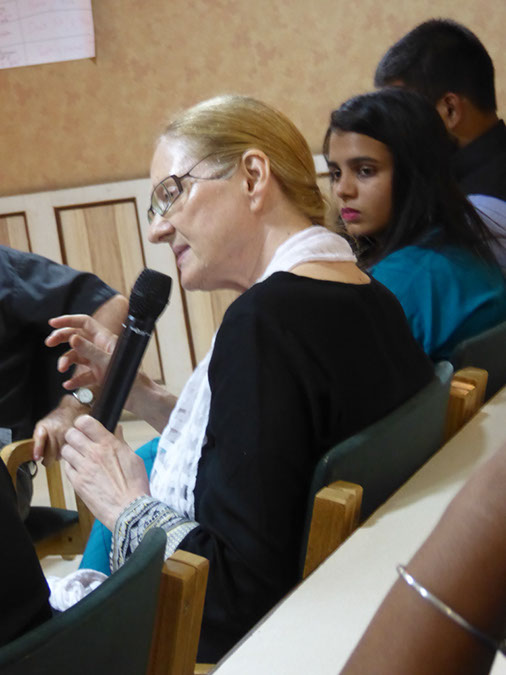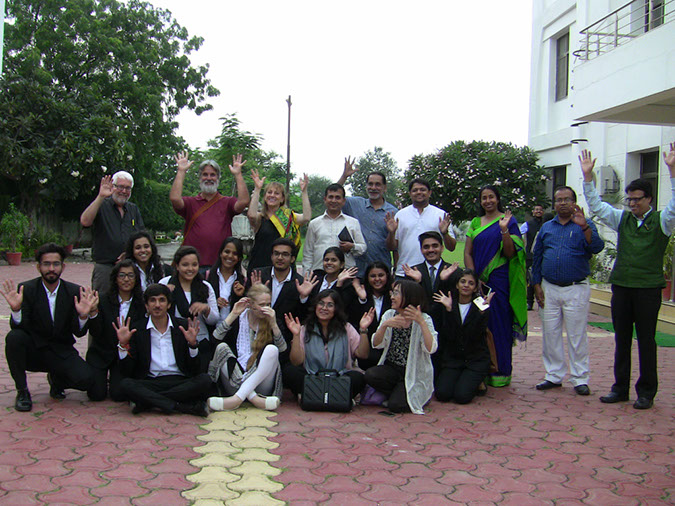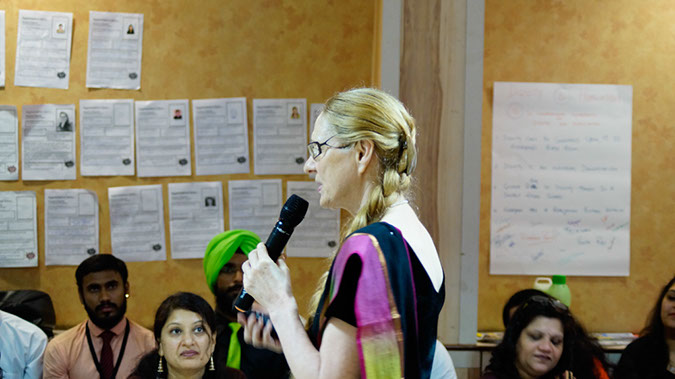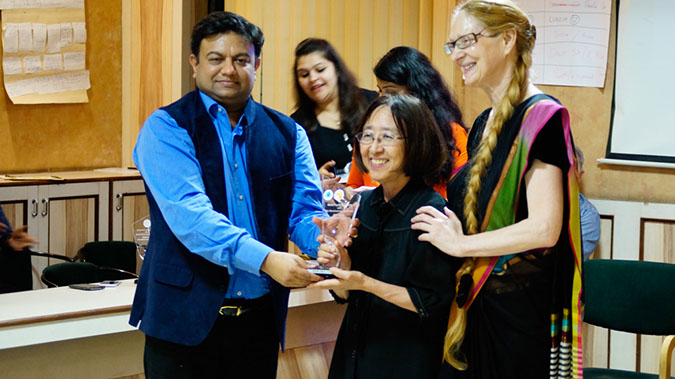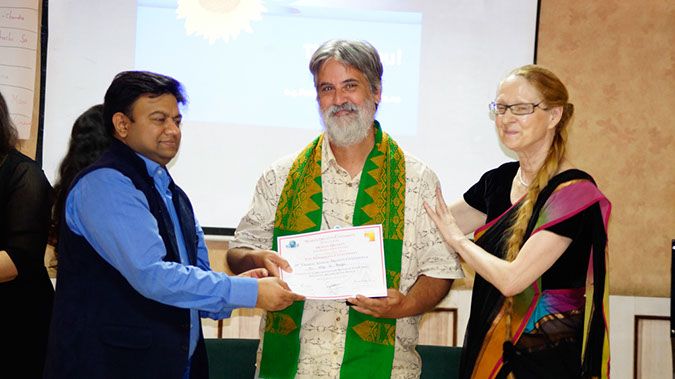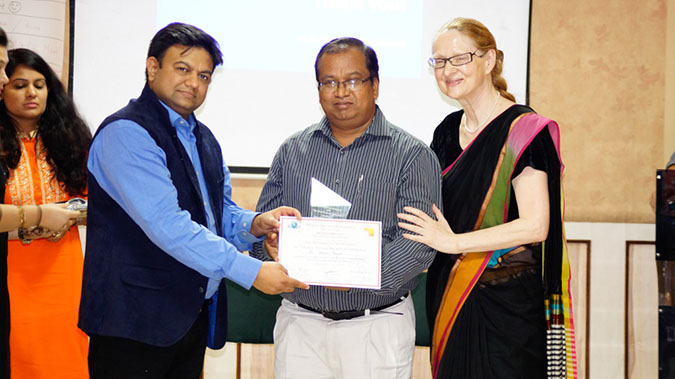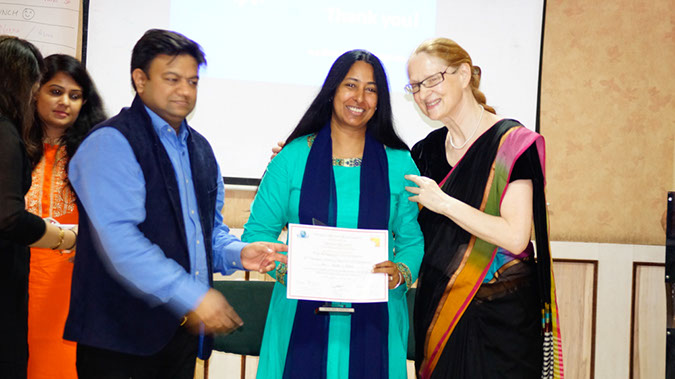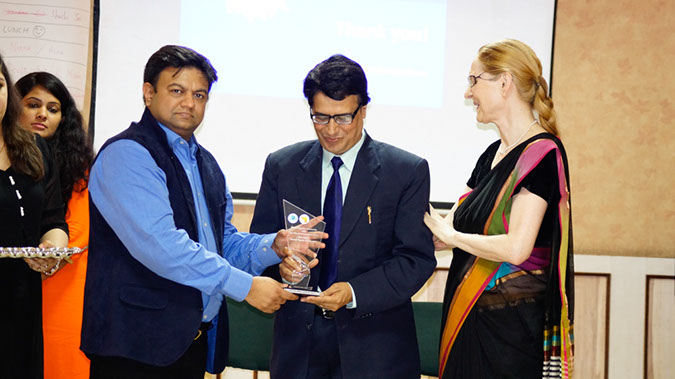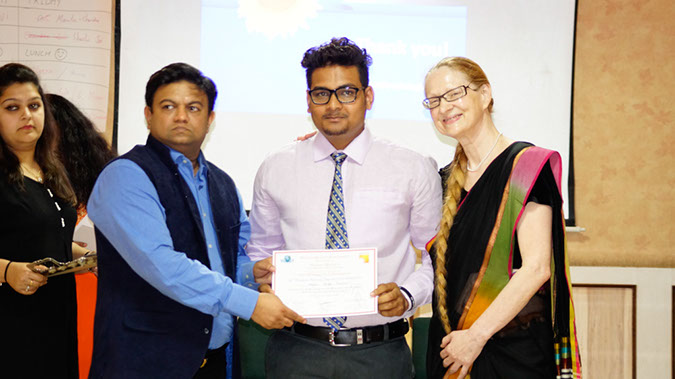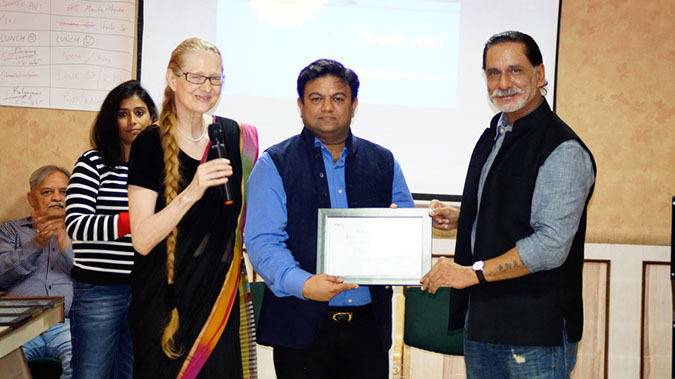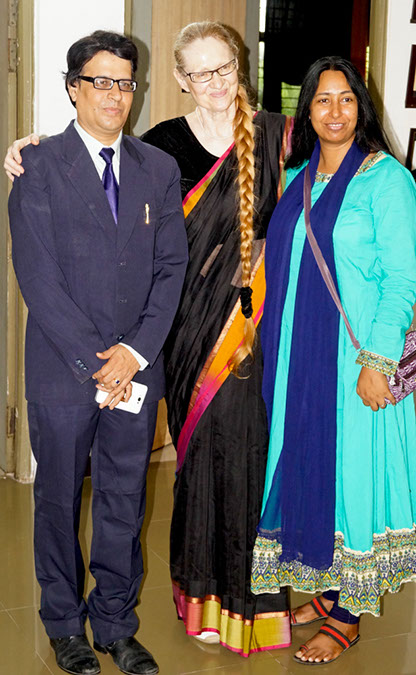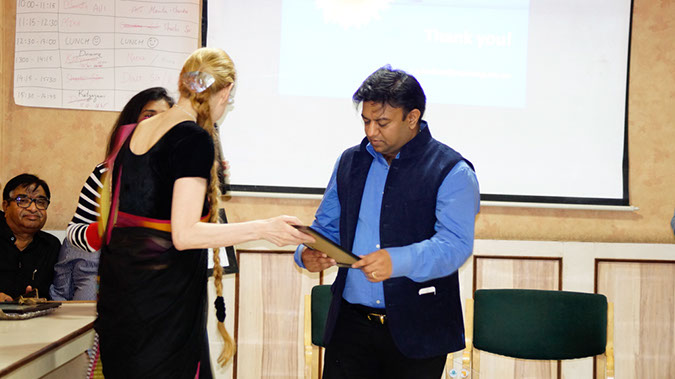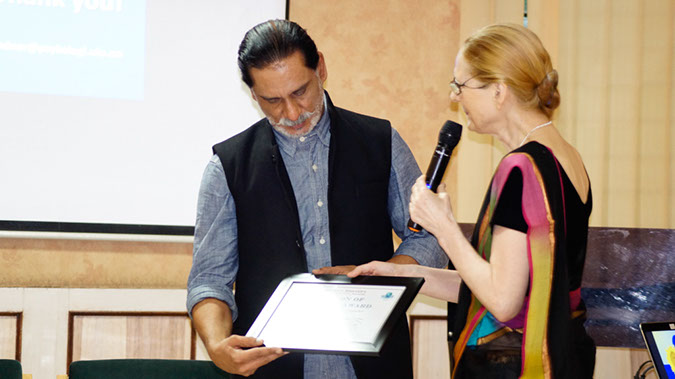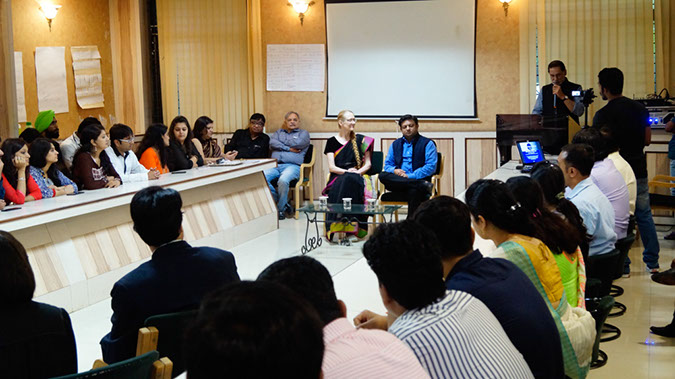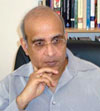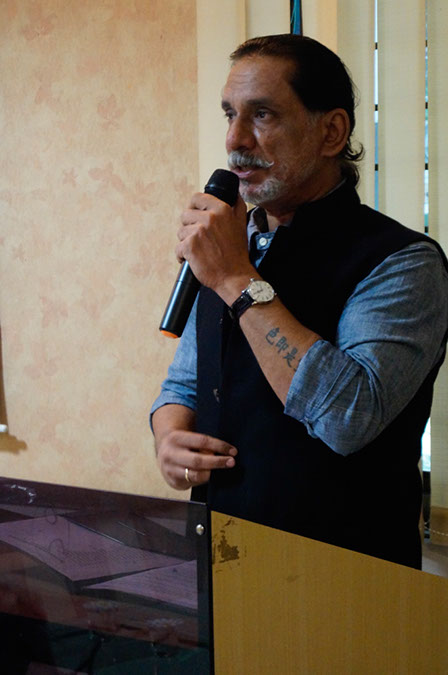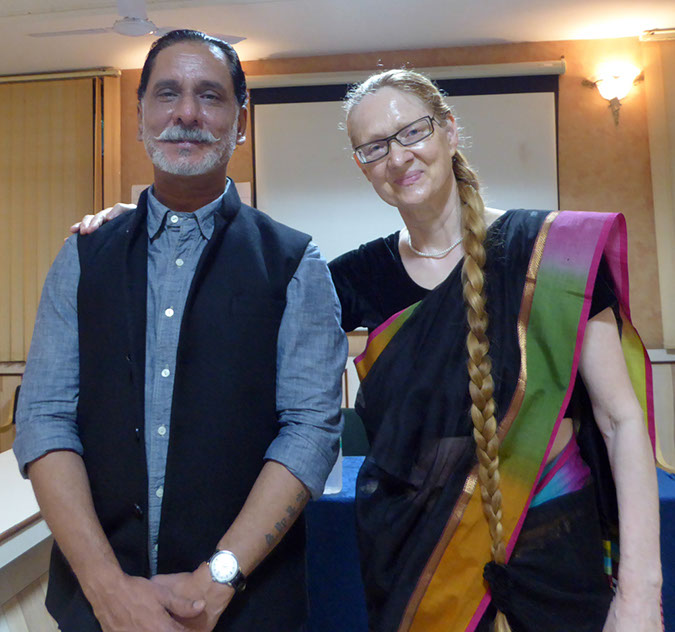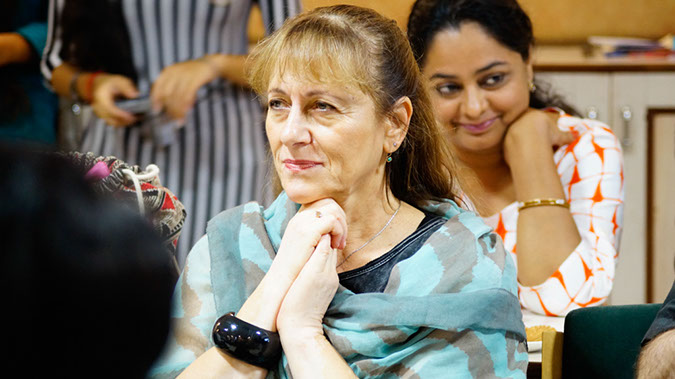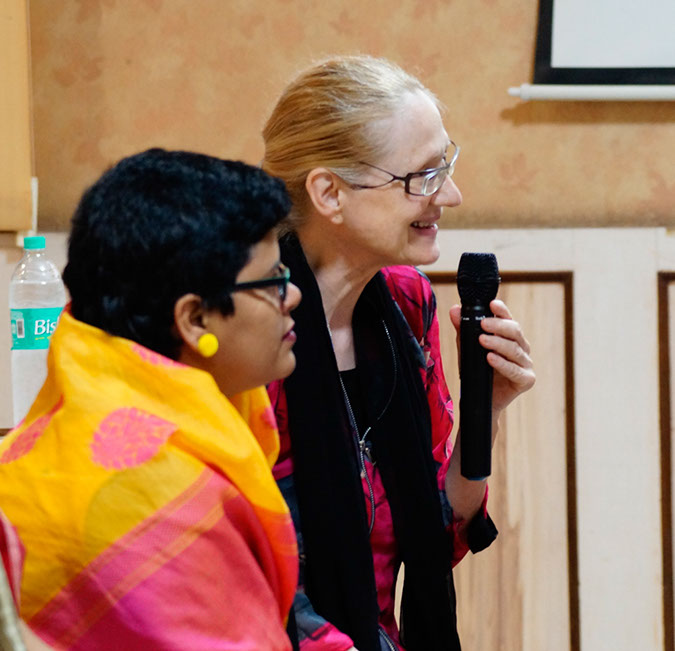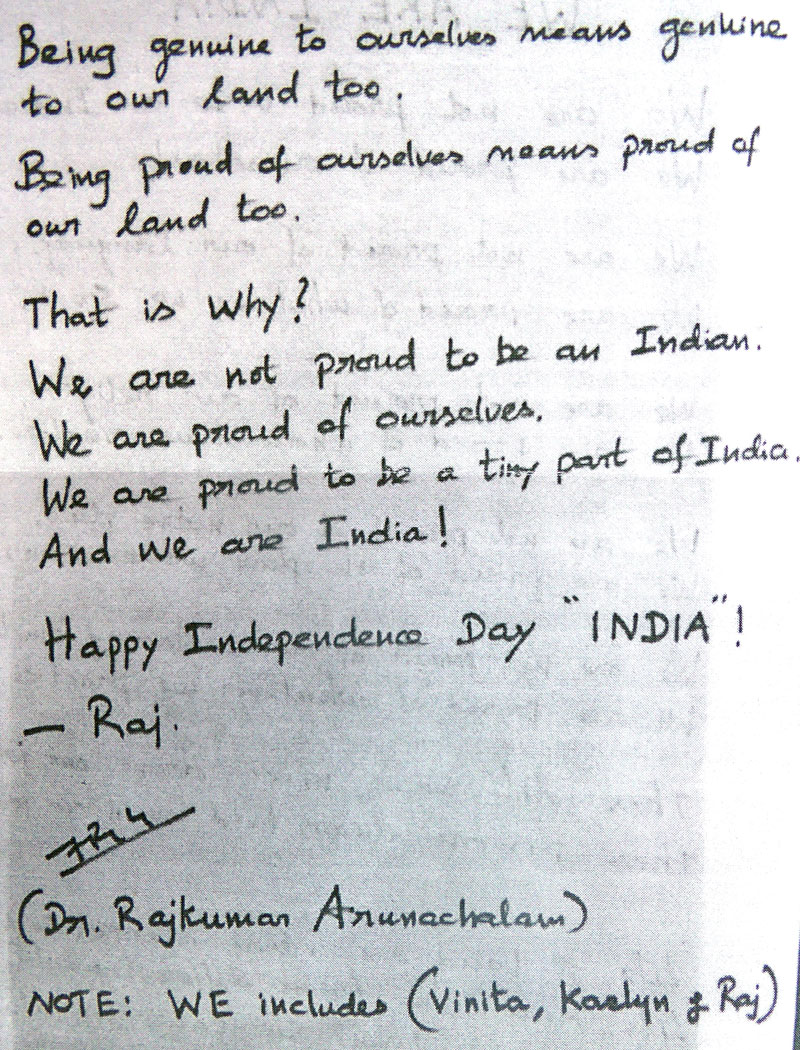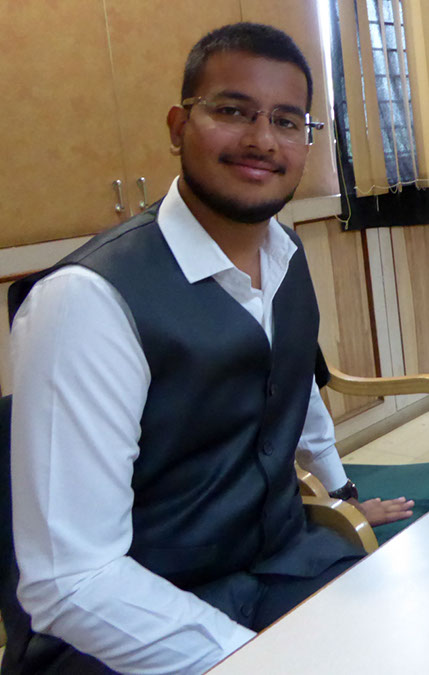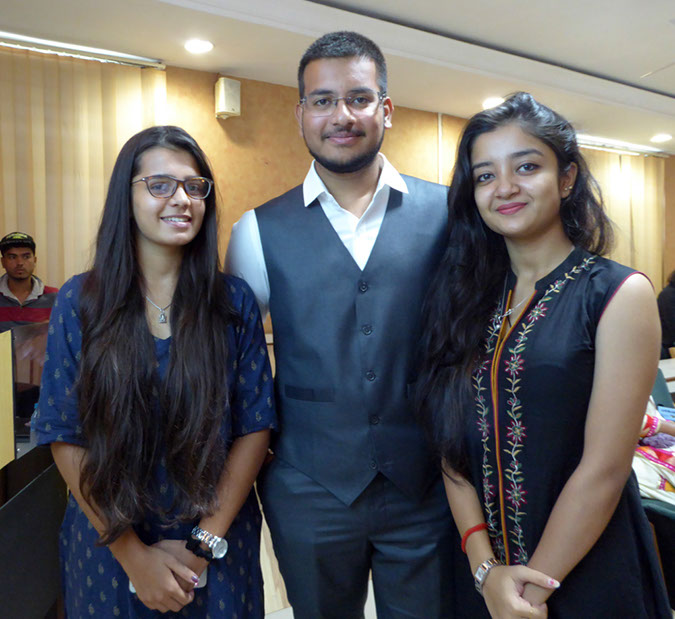29th Annual Conference of Human Dignity and Humiliation Studies
'Dignity in Times of Globalisation'
in Indore, Madhya Pradesh, Central India
16th - 19th August 2017
Please see Newsletter 29, written directly after this conference - you are warmly invited to contribute to it! (Please send your comments to us so that we can include them.)
Please see here your personal invitation, a short programme, and our press release.
If you wish to participate in our future conferences, please email us. Please know that you are always invited to spend the entire conference with us, so that real dignity-family-building can emerge! All our events are part of an ongoing effort to nurture a global dignity community.
For all our conferences, you are invited to fill out our Appreciative Introduction form, print it out, and bring it with you.
There are no registration fees for our conferences, we usally share cost according to ability. We thank all participants of this conference for paying for their own travels and housing, and the Renaissance University for offering a wonderful venue with delicious vegetarian lunch, tea, coffee and cookies.
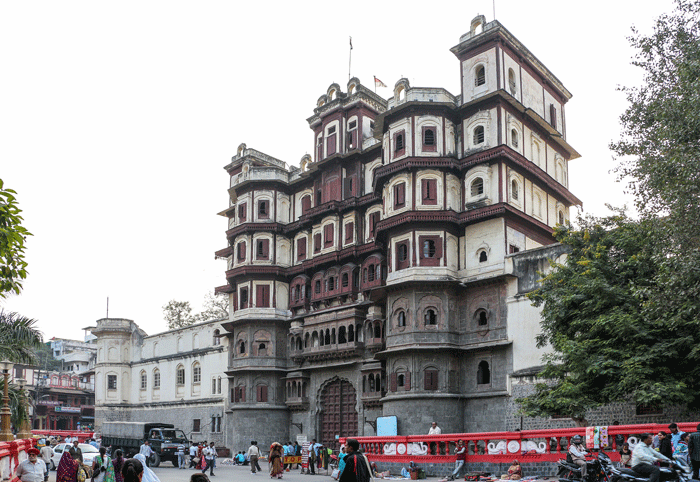
The historical palace of Rajwada is a seven storied structure built by the Holkars of the Maratha Empire, therefore also known as Holkar Palace, one of the oldest structures and major historical sites located in the heart of the city of Indore close to the Chhatris
Our conferences have two parts, a workshop part and a public part
1. Workshop with Dignilogues
Wednesday - Friday, 16th - 18th August, 10.00 am
Renaissance University
(a new addition to the Renaissance-Indira Group of Institutions, former Indore-Indira Group of Institutions)
Sanwer Road, behind Aurobindo hospital, Gram Reoti, Indore-452015 (see map)
We will join together as a collaborative community, we will explore the urgent need for dignity in an age of globalisation.
2. Public Function
Saturday, 19th August, 11.30 am
Renaissance University
Sanwer Road, behind Aurobindo hospital, Gram Reoti, Indore-452015 (see map)
Post-Conference Activities for those Interested
Heritage places: Rajwada Palace, Lal Baag Palace, Ujjain Mahakaleshwar Jyotirlinga of Lord Shiva, the Omkareshwar Omkareshwar Mahadev Temple, the ruin city of Mandu, the Ahilya Fort.
The city of Bhopal is 190 km away. The city attracted international attention in December 1984 after the Bhopal disaster.
Local Hosts, Conveners, and Coordinators
Special thanks go to the Founder and Group Chairman of the Renaissance University, Swapnil Kothari, and his visionary support team, for offering the venue for this conference, and for their untiring support for making this conference successful. Particular thanks go to Amol Mishra, Vinita Raj, and Dr. Rajesh Dixit for their helpful encouragement in support of this event.
We warmly thank Deepak Tripathi for creating this wonderful connection between our global dignity work and the Renaissance University
See his book A Journey Through Turbulence (Lake Oswego, OR: Dignity Press, 2013)
On the fourth day of the conference, on 19th August 2017, the Human Dignity and Humiliation Studies network honoured Swapnil Kothari for his dignified and dignifying generosity in hosting this conference, together with Sarabjeet Singh Bharaj, Amol Mishra, and their team.The conference was hosted by the Renaissance University in cooperation with the World Dignity University initiative
The Renaissance-Indira Group (former Indore-Indira Group) consists of a number of colleges, including a business school and a law school. Indore is a hub of education and industry for Central India and has an illustrious history behind it.
Day One, Wednesday, 16th August 2017, picture taken by the press photographer from the Independent Mail

'German Evelin Thinks That the Whole World Is Her Home', in Independent Mail, 18th August 2017
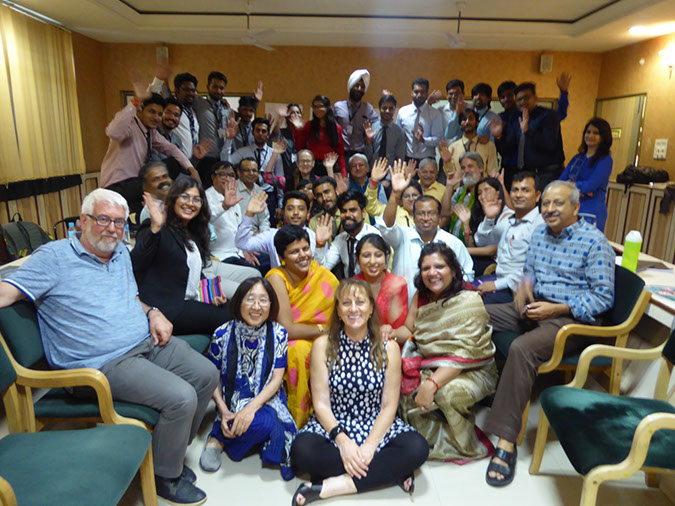
Day Two, Thursday, 17th August 2017
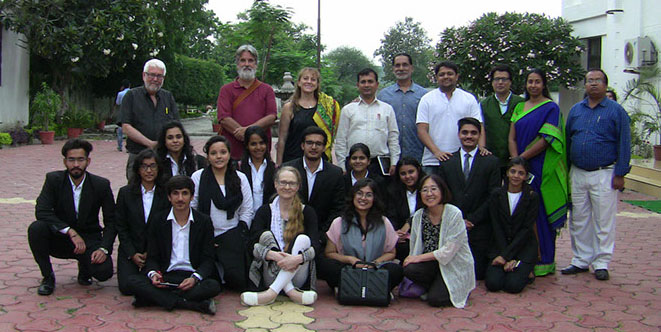
Day Three, Friday, 18th August 2017

Day Four, Saturday, 19th August 2017• If you wish to participate in our future conferences, please send us an email
• Thank you for obtaining your own private tourist visa to India.
• See here an Appreciative Introduction template for participants to fill in, print out, and bring to our conferences: Word / Pdf
• Please see here an early invitation (Pdf, 20th June 2017) and your final reminder (Pdf, 1st August 2017).
• Please see a short programme of the conference.
• There is no registration fee for our conferences. To cover our expenses, we always summarise the costs during the conference and invite participants to contribute according to their ability. This collaborative approach to financing allows us to keep our conferences affordable for all. We thank all participants of this conference for paying for their own travels and housing, and the Renaissance University for offering a wonderful venue, together with delicious vegetarian lunch in the garden, and for coffee, tea, and cookies in the mornings and afternoons.
• Have a look at all our previous conferences and see also our Newsletters, written after our past conferences.
• How to get to the conference venue
Participants travelled to Indore in Madhya Pradesh in Central India. Participants from abroad obtained their own private tourist visa to India. Visitors to India must obtain a visa from an Indian diplomatic mission unless they come from one of the visa-exempt countries or a country whose citizens may obtain a visa online. India plans to introduce a 'visa on arrival' system. If such a system is introduced, access should become easier, because people would not need to get visas in their home countries. Participants could take a taxi from the airport to the Amarvilas Hotel (ca. 200 Rupees, see a map)
• Where to stay
Amarvilas is a reputed traditional hotel with great hospitality and very affordable prices, ca. 10 km from the conference venue. The hotel's address is 1 B, Chandra Nagar, A.B. Road, Chandra Nagar, Indore, Madhya Pradesh 452001, India (see a map).

• Please click on the photo to see it larger
Since all participants in our conferences are fully responsible for bearing the cost of their own travel, transportation, and accommodation arrangements, we always kindly ask local participants who reside in close proximity of the conference venue to lend a helping hand to those traveling from afar, which also helps us keep our events collaborative and affordable for all. Allow us to extend our warmest thanks to all those who reside in Indore and generously gave their support to our foreign participants! We are deeply thankful, among others, to Pooja Vyas, and Dr. Rajesh Dixit and his wife Dr. Amita Neerav, for including Evelin Lindner into their homes throughout July and August. Dr. Rajesh Dixit and his wife Dr. Amita Neerav declared their home to be a Dialogue Home for our global dignity family and Donna T. Fujimoto and Michael W. Morgan were welcomed there, too. Avi and Nira Shahaf chose to stay in the Sayaji Hotel. Vinita Raj and Menika Soni Jadon generously extended their care to our foreign visitors also in the evenings. We thank them most warmly!
• Practical details
How to Use an Indian Bathroom
• Post-conference experiences
The city of Bhopal is 190 km away. The city attracted international attention in December 1984 after the Bhopal disaster.
We thank Yashasvi Dhand and Tejas Kumar for creating this great list of landmarks around Indore for us (please click on the photos or here to see them larger):
• Please kindly note that...
• There is no registration fee for our conferences. To cover our expenses, we always summarise the costs during the conference and invite participants to contribute according to their ability. This collaborative approach to financing allows us to keep the conference affordable for all.
• We like to get to know participants prior to our conferences and workshops, and prior to issuing an invitation.
• All our gatherings are by invitation only, please approach us so that we can include you and register you.
Only our Public Events are open to everybody without registration.
• The Non-Public Parts of our gatherings have limited enrollment.
• Participants are encouraged to find their own sources of funding or economic support to participate in our conferences. We offer our nurturing work as our gift of love and care to you, and we
would like to lovingly invite everybody to contribute to this gift economy. If you need funding for your travels and housing, please inquire in your country and your university about possibilities. See, among others, for the US, www.supportcenter.org and www.foundationscenter.org. The Weinstein International Fellowship program, inaugurated in 2008, provides opportunities for individuals from outside the United States to visit the U.S. to learn more about dispute resolution processes and practices and to pursue a project of their own design that serves to advance the resolution of disputes in their home countries.
• Participants in our conferences are kindly asked to handle all of their travel arrangements and required documentation, including requests for visas, on their side. HumanDHS is a volunteer initiative and does not have the staff or resources to assist with visa requests.
• Permissions
During our conferences, we always ask all participants for their permission to have their pictures or videos posted on our website, however, if you change your mind later, either in total or for specific pictures/videos, please let us know! Thank you! Since we wish to walk the talk of dignity, it is very important for us to do our utmost in respecting everybody's privacy. We refrain from gathering written permissions from you during our conferences, since we value the building of mutual trust in relationships, and we also would like to refrain from contributing to an ever more bureaucratic and legalistic society.
• Green conference and reinventing organization
We strive to organize our conferences as 'Green Conferences'. Lynn King kindly advises us. We also thank Vegard Jordanger for making us aware of Frederic Laloux's work on Reinventing Organizations (2014).
• What happened in our previous conferences?
Please have a look at all our previous conferences and the newsletters written after these conferences.
• Frame
• List of Conveners
• Programme
• List of Participants
• Papers
• Background Material
• Previous Reflections on the Format of the Conference
• Pictures and videos
Still photos
The still photos come in several web galleries. We so much thank Amit Singh, Donna T. Fujimoto, Amita Neerav, Mike Morgan, Suraj Pillai, and many others for taking such lovely photos!
Day One, Wednesday, 16th August 2017
• Please click here to see the ten Press photos
• Please click here to see all 189 pictures from Evelin's camera of Day One
• Please click here to see the programme for the entire conference that we created together on Day One, and all 20 Dignilogue posters
• Please click here to see the four photos Chandra Siwakoti kindly took
• Please click here to see the four photos Vinita Raj took of Evelin getting her hair in order...
Day Two, Thursday, 17th August 2017
• Please click here to see all 254 pictures from Evelin's camera of Day Two
• Please click here to see the 197 photos that Amit Singh kindly took
Day Three, Friday, 18th August 2017
• Please click here to see all 344 pictures from Evelin's camera of Day Three
• Please click here to see the 229 photos that Amit Singh kindly took
Day Four, Saturday, 19th August 2017
• Please click here to see all 82 pictures from Evelin's camera of Day Four
• Please click here to see the 216 photos that Amit Singh kindly took
All of the conference
• Please click here to see all 112 pictures taken by Mike Morgan througout the entire conference
Videos
Thank you so much, dear Suraj Pillai for stepping up and doing such wonderful video-taping!
'Messages to the World' for the World Dignity University initiative:
Day One, 16th August, 2017
• 01 WDU Message: Vinita Raj and Katyayani Singh
Day Two, 17th August, 2017:
• 02 WDU Message: Michael W. Morgan and Dr. Rajesh Dixit
• 03 WDU Message: Avi Shahaf and Rachana Ghadge
• 04 WDU Message: Michael W. Morgan and Evelin Lindner
• 05 WDU Message: Donna T. Fujimoto and Vinita Raj
• 06 WDU Message: Katyayani Singh and Evelin Lindner
Day Three, 18th August, 2017:
• 07 WDU Message: Mamta Siwakoti and Evelin Lindner
• 08 WDU Message: Shashi Kumar and Mike Morgan
• 09 WDU Message: Dr. Rajesh Dixit, Dr. Amita Neerav, and Evelin Lindner (17th September 2017) (Hindi)
• 10 WDU Message: Dr. Rajesh Dixit, Dr. Amita Neerav, and Evelin Lindner (17th September 2017) (English)
Documentation of the entire conference:
Day One
• 01 Amol Mishra Welcomed Everybody
• 02 Evelin Lindner Welcomed Everybody
• 03 All Were Watching Linda Hartling's Welcome Video
• 04 Evelin Lindner's Introductory Talk
• 05 Janvi Jain Sang the Beloved Film Song 'Lag Jaa Gale' from the Movie ''Woh Kaun Thi'
• 06 Getting to Know Each Other
• 07 A Student Played Guitar
• 08 Participants Presented Each Other
• 09 Pranjali Singh Parihar Taught 'Kathak' Dance to Nira Shahaf
• 10 Evelin Lindner Explained the Dignilogue Format
• 11 Preparing the Dignilogues
• 12 Dr. Amita Neerav Sang the Beloved Film Song 'Dil Ka Diya Jala Ke Gaya' and then Spoke on Dignity
• 13 Vinita Raj Explained her Dignilogue Topic
• 14 Nira Shahaf Explained her Dignilogue Topic
• 15 Mamta Siwakoti Explained her Dignilogue Topic
• 16 Mike Morgan Explained his Dignilogue Topic
• 17 Shashi Kumar Explained his Dignilogue Topic
• 18 Chandra Siwakoti Explained his Dignilogue Topic
• 19 Navneet Dubey Explained his Dignilogue Topic
• 20 Avi Shahaf Explained his Dignilogue Topic
• 21 Katyayani Singh Explained her Dignilogue Topic
• 22 Dr. Rajesh Dixit Explained his Dignilogue Topic
• 23 Donna T. Fujimoto Explained her Dignilogue Topic
• 24 Parth Jain Explained his Dignilogue Topic
• 25 Dr. Atul Bhat Sang Two Beloved Film Songs
• 26 Dignilogue of Vinita Raj
• 27 WDU Message: Vinita Raj and Katyayani Singh
Day Two
• 28 Dignilogue of Avi Shahaf
• 29 Thanking Nira and Avi Shahaf
• 30 Dignilogue of Mike Morgan
• 31 WDU Message: Michael W. Morgan and Dr. Rajesh Dixit
• 32 WDU Message: Avi Shahaf and Rachana Ghadge
• 33 WDU Message: Michael W. Morgan and Evelin Lindner
• 34 Dignilogue of Donna T. Fujimoto
• 35 WDU Message: Donna T. Fujimoto and Vinita Raj
• 36 Donna T. Fujimoto Sang a Japanese Song
• 37 The Students Sang a Punjabi Folk Song
• 38 Dr. Atul Bhat Sang a Beloved Film Song
• 39 The Students Sang
• 40 Dignilogue of Katyayani Singh
• 41 Dr. Atul Bhat Sang Another Beloved Film Song
• 42 Mahendra Sharma and Anoop Swarup Visited
• 43 WDU Message: Katyayani Singh and Evelin Lindner
Day Three
• 44 Dignilogue of Mamta Siwakoti
• 45 Dignilogue of Dr. Rajesh Dixit
• 45.1 WDU Message: Dr. Rajesh Dixit, Dr. Amita Neerav, and Evelin Lindner (17th September 2017) (Hindi)
• 45.2 WDU Message: Dr. Rajesh Dixit, Dr. Amita Neerav, and Evelin Lindner (17th September 2017) (English)
• 46.1 Dignilogue of Shashi Kumar (Part 1)
• 46.2 Dignilogue of Shashi Kumar (Part 2)
• 47.1 Sunita Kasliwal Explained Shahi Paneer Masala
• 47.2 Sunita Kasliwal Explained White Gravy Paneer Masala
• 47.3 Sunita Kasliwal Explained Yellow Pulses
• 47 Students Received Chocolate
• 48 Dignilogue of Nira Shahaf Inside the Conference Room
• 49 Dignilogue of Nira Shahaf Part Outside of the Conference Room
• 50 Pranjali Singh Parihar Taught Nira Shahaf to Dance 'Kathak'
• 51 WDU Message: Mamta Siwakoti and Evelin Lindner
• 52 WDU Message: Shashi Kumar and Mike Morgan
• 53 Mamta Siwakoti Sang a Nepalese Song
• 54 The Students Sang
• 55 Nira and Avi Shahaf Sang a Song from Israel
• 56 Dignilogue of Parth Jain and Navneet Dubey
• 57 Saying Good-Bye to Nira and Avi Shahaf
• 58 Swapnil Kothari Visited with His Students
• 59 Evelin Lindner's Comments
• 60 Swapnil Kothari's Comments
• 61 Amol Mishra Rounded Up Day Three
Day Four
• 62 Amol Mishra and Swapnil Kothari Opened the Public Function
• 63 Evelin Lindner Spoke on 'Dignity in Times of Globalisation'
• 64 Honouring Donna T. Fujimoto
• 65 Honouring Mike Morgan
• 66 Honouring Chandra and Mamta Siwakoti
• 67 Honouring Shashi Kumar
• 68 Honouring Dr. Amita Neerav
• 69 Honouring Dr. Rajesh Dixit
• 70 Honouring Vinita Raj
• 71 Honouring the International Post Graduate Diploma in Management Students
• 72 Honouring Evelin Lindner
• 73 Honouring Amol Mishra
• 74 Honouring Swapnil Kothari
• 75 Honouring Dr. Amita Neerav and Dr. Rajesh Dixit
• 76 Honouring Vinita Raj
• 77 Honouring Pooja Upadhaya Vyas
• 78 Honouring Sarabjeet Singh Bharaj
• 79 Honouring DeepakTripathi
• 80 Honouring Menika Soni Jadon
• 81 Honouring Rachana Ghadge
• 82 Saying Good-Bye
• 83 Amol Mishra Sang a Beloved Film Song
• 84 Dr. Amita Neerav Sang 'Kisi Ki Yaad Mein Dunia Ko Hai Bhilaaye Hue'
• What happened in our previous meetings? Please see Newsletters!
Frame
by Linda Hartling, 2004
In our meetings we aim at creating a humiliation-free, collaborative learning environment characterised by mutual respect, mutual empathy, and openness to difference. The perspective of 'appreciative enquiry' is a useful frame of our work. Our HumanDHS efforts are not just about the work we do together, but also about HOW WE WORK TOGETHER. At appropriate points during our meetings, for example at the end of each day, we take a moment to reflect on the practices observed that contributed to an appreciative/humiliation-free learning experience.
It is important to emphasise that an appreciative approach is not about expecting people to agree. In fact, differences of opinion enrich the conversation and deepen people's understanding of ideas. Perhaps, this could be conceptualised as 'waging good conflict' (Jean Baker Miller), which means practicing radical respect for differences and being open to a variety of perspectives and engaging others without contempt or rankism. As we have seen in many fields, contempt and rankism drain energy away from the important work that needs to be done. Most people only know 'conflict' as a form of war within a win/lose frame. 'Waging good conflict', on the other side, is about being empathic and respectful, making room for authenticity, creating clarity, and growth.
Please see:
• An Appreciative Frame: Beginning a Dialogue on Human Dignity and Humiliation, written by Linda in 2005
• Appreciative Facilitation: Hints for Round Table Moderators, kindly written in February 2006 by Judith Thompson to support the moderators of our workshops.
• Buddhist Teachings on Right Speech, kindly provided to us by Thomas Daffern in 2006, relating to our quest for appreciative enquiry, caring and being.
• Please see also these videos on our Appreciative Frame, created by Linda Hartling:
- Appreciative Enquiry 1, a video that was recorded on October 30, 2011, in Portland, Oregon, USA, by Evelin Lindner, for the World Dignity University initiative.
- Appreciative Enquiry 2, a video that was uploaded onto YouTube on August 11, 2012, in preparation of the 19th Annual Conference of Human Dignity and Humiliation Studies, 27th-30th August 2012, in Oslo, Norway.
- Our Appreciative Frame 3, a video created in December 2014 (see also Pdf), for the 2014 Workshop on Transforming Humiliation and Violent Conflict, in New York City, December 4–5, 2014.
- Appreciative Enquiry 4, a video that was recorded on May 27, 2015, in Portland, Oregon, USA, by Linda Hartling, for the 25th Annual Conference of Human Dignity and Humiliation Studies, in Kigali, Rwanda, 2nd - 5th June 2015.
- Appreciative Frame, by Linda Hartling on December 8, 2016, at the 2016 Workshop on Transforming Humiliation and Violent Conflict, in New York City, December 8 – 9, 2016.
• Dignilogue Tips and Dynamic Dignilogue List, created by Linda Hartling on October 10, 2015, for the 2015 Workshop on Transforming Humiliation and Violent Conflict, in New York City, December 3 – 4, 2015.
List of Conveners
Evelin Gerda Lindner, Medical Doctor, Clinical and Social Psychologist, Ph.D. (Dr. med.), Ph.D. (Dr. psychol.), Organiser of the HumanDHS Conferences, in Support of the Local Conveners
Evelin Gerda Lindner is the Founding President of the Human Dignity and Humiliation Studies (HumanDHS) network and initiator of the World Dignity University initiative. She is a transdisciplinary social scientist and humanist who holds two Ph.D.s, one in medicine and one in psychology. In 1996, she designed a research project on the concept of humiliation and its role in genocide and war. German history served as starting point. She is the recipient of the 2006 SBAP Award and 2009 'Prisoner’s Testament' Peace Award. She is affiliated with the University of Oslo, Norway, with its Department of Psychology since 1997, periodically also with its Center for Gender Research and with its Norwegian Centre for Human Rights, furthermore, with Columbia University in New York since 2001, first with its Conflict Resolution Network (CU-CRN), which in 2009 was superseded by the Advanced Consortium on Cooperation, Conflict, and Complexity (AC4). She is also affiliated with the Maison des Sciences de l'Homme in Paris since 2001. Lindner is teaching globally, including in South East Asia, the Middle East, Australia, Africa, and other places globally. [read more]
Please see:
• Interview with Evelin Lindner - Challenges of our Time; Learning to Connect, December 8, 2016
• Mini-Documentary of the Annual Human Dignity and Humiliation Studies Workshop on Transforming Humiliation and Violent Conflict 'The Globalization of Dignity', December 8 - 9, 2016
• Article by Amita Neerav in the weekend edition of Naidunia ('New World'), 30th July 2017. The title of the article is 'A Global Saint Connects People of the World with a Circle of Love Gifts: A special talk with Evelin G. Lindner, who has been nominated consecutively for the third time for the Nobel Peace Prize'.
Linda Hartling, Ph.D., Social Psychologist, Organiser of the HumanDHS Conferences, Supporting the Local Conveners
Dr. Linda M. Hartling is the Director of Human Dignity and Humiliation Studies (HumanDHS). She is also a Member of the HumanDHS Global Advisory Board, HumanDHS Global Core Team, HumanDHS Global Coordinating Team, HumanDHS Research Team, and HumanDHS Education Team. She is the Editor of the Journal of Human Dignity and Humiliation Studies (JHDHS).
Hartling is affiliated with the Jean Baker Miller Training Institute (JBMTI) at the Stone Center, which is part of the Wellesley Centers for Women at Wellesley College in Massachusetts.
Until November 2008, she was its Associate Director. Hartling is a member of the JBMTI theory-building group advancing the practice of the Relational-Cultural Theory, which is a new model of psychological development. In addition, Hartling coordinates and contributes to training programs, publications, and special projects for the JBMTI. She holds a doctoral degree in clinical/community psychology and has published papers on resilience, substance abuse prevention, shame and humiliation, relational practice in the workplace, and Relational-Cultural Theory. [read more]
Please see:
• Humiliation: Real Pain, A Pathway to Violence, the draft of Linda's paper for Round Table 2 of our 2005 Workshop on Humiliation and Violent Conflict, Columbia University, New York.
• Humiliation: Assessing the Impact of Derision, Degradation, and Debasement, first published in The Journal of Primary Prevention, 19(4): 259-278, co-authored with T. Luchetta, 1999.
• Shame and Humiliation: From Isolation to Relational Transformation, the Jean Baker Miller Training Institute (JBMIT), Wellesley Centers for Women, Wellesley College No. 88, Wellesley, MA 02481, co-authored with Wendy Rosen, Maureen Walker, Judith V. Jordan, 2000.
• Humiliation and Assistance: Telling the Truth About Power, Telling a New Story, paper prepared for the 5th Annual Conference of Human Dignity and Humiliation Studies 'Beyond Humiliation: Encouraging Human Dignity in the Lives and Work of All People', in Berlin, 15th -17th September, 2005.
• Mini-Documentary of the Annual Human Dignity and Humiliation Studies Workshop on Transforming Humiliation and Violent Conflict 'The Globalization of Dignity', December 8 - 9, 2016
Deepak Tripathi, PhD, FRHistS is a British historian of the Greater Middle East and South Asia
Deepak Tripathi, PhD, FRHistS is a British historian of the Greater Middle East and South Asia with a particular emphasis on the Cold War and the United States in the post-Soviet world. He is an honorary research fellow in social sciences at the University of Roehampton in London. Among his books is A Journey Through Turbulence (Dignity Press, 2013). His other books include a trilogy encompassing Breeding Ground: Afghanistan and the Origins of Islamist Terrorism (2011), Overcoming the Bush Legacy in Iraq and Afghanistan (2010) and Imperial Designs: War, Humiliation and the Making of History (2013), published by Potomac Books, Inc., Washington, D.C. Earlier, he spent his long career in journalism (1974-2000), primarily in the BBC where he was a correspondent, commentator and editor. In the early 1990s, Tripathi set up the BBC Bureau in Kabul and was the corporation's resident correspondent in Afghanistan. He also reported from Syria, Pakistan, Sri Lanka and India.
Deepak Tripathi has published A Journey Through Turbulence in Dignity Press in 2013
Please see:
• Imperialism & Humiliation, a video presentation for HumiliationStudies.org, where Deepak Tripathi explains the relationship between imperialism and humiliation.
• A Journey Through Turbulence, Lake Oswego, OR: Dignity Press, 22nd March, 2013, with a Foreword by Victoria Fontan, a collection of Deepak Tripathi's writings in the last decade, covering a vast landscape and many subjects, from the United States, Britain and the European Union to conflicts in South Asia and the Middle East, the Arab Awakening, the power shift from west to east, and the new great game in the east. These essays have an insightful analysis of the present in the context of the past.
• A Journey Through Turbulence, video, created on 29th March 2013, in connection with his book A Journey Through Turbulence.
• Imperial Design: War, Humiliation and the Making of History, published on 8th May 2013, is a video about Imperial Designs, the final volume of Deepak Tripathi's trilogy including Breeding Ground: Afghanistan and the Origins of Islamist Terrorism and Overcoming the Bush Legacy in Iraq and Afghanistan published by Potomac Books, an imprint of the University of Nebraska Press.
Workshop Programme
Venue: Renaissance University, Sanwer Road, behind Aurobindo hospital, Gram Reoti, Indore-452015 (see map)
Wednesday, 16th August 2017, Workshop Day One

• Please click here to see the ten press photos
• Please click here to see all 189 pictures from Evelin's camera of Day One
• Please click here to see the programme for the entire conference that we created together on Day One, and all 20 Dignilogue posters
• Please click here to see the four photos Chandra Siwakoti kindly took
• Please click here to see the four photos Vinita Raj took of Evelin getting her hair in order...
• Please click here to see all 112 pictures taken by Mike Morgan througout the entire conference

This is the programme that we co-created on Day One for the entire three days of the workshop, adapting it flexibly throughout those days. Thank you, dear Avi Shahaf and Yashasvi Dhand, for making such a great programme poster! Please click here to see more Dignilogue posters.
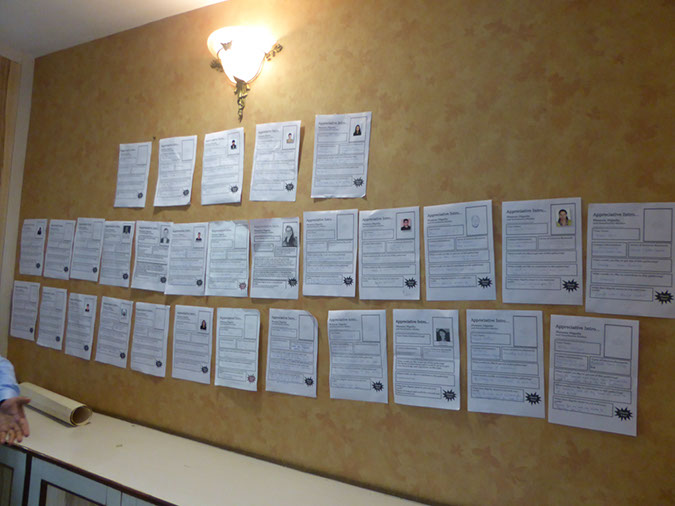
These are the Appreciative Introductions of the participants











International Batch of Students of Post Graduate Diploma in Management at the Indore-Indira Business School:


















Please click on the images above or here to see all Introductions (with the contact information blackened for the protection of privacy)

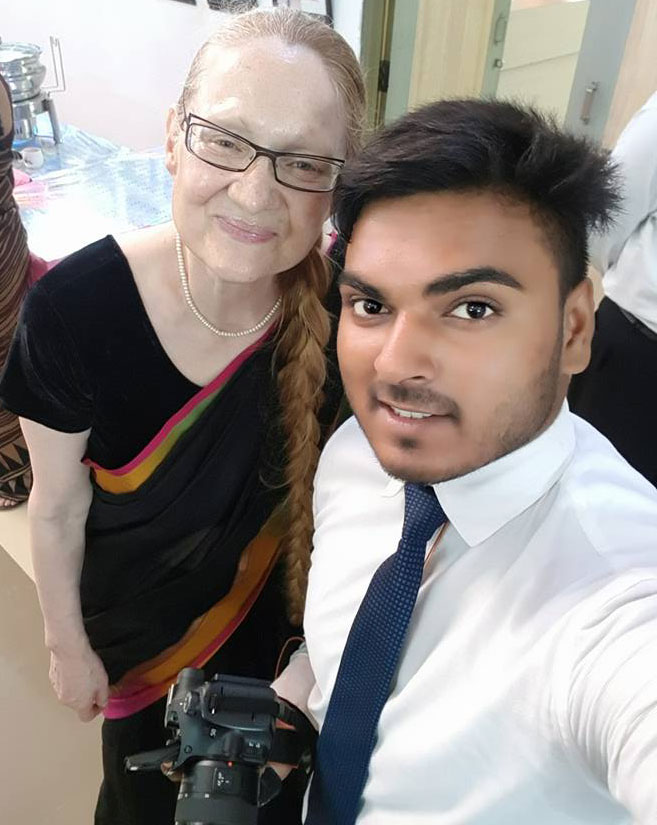


A big THANK-YOU
goes to Suraj Pillai and Amit Singh for creating such wonderful videos and photos! And another big THANK-YOU to the wonderful team of dear Sunita Kasliwal and Pandey-ji, who cared for our lunch, coffee, tea, and cookies during mornings and afternoon!
• 10.00 Welcome by Amol Mishra, as Representative of the Host Institution, the Renaissance-Indira Group of Institutions (Video)
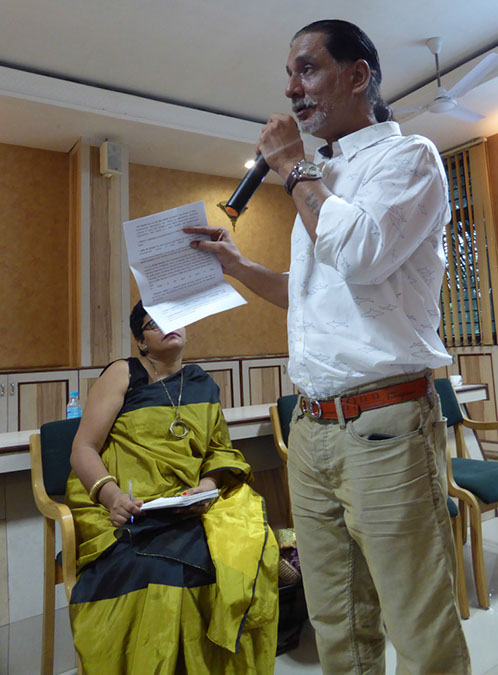
• Please click here to see the ten press photos
• Please click here to see all 189 pictures from Evelin's camera of Day One
• Please click here to see the programme for the entire conference that we created together on Day One, and all 20 Dignilogue posters
• Please click here to see the four photos Chandra Siwakoti kindly took
• Please click here to see all 112 pictures taken by Mike Morgan througout the entire conference
• Welcome by Evelin Lindner, as Representative of Human Dignity and Humiliation Studies and the World Dignity University initiative (Video)
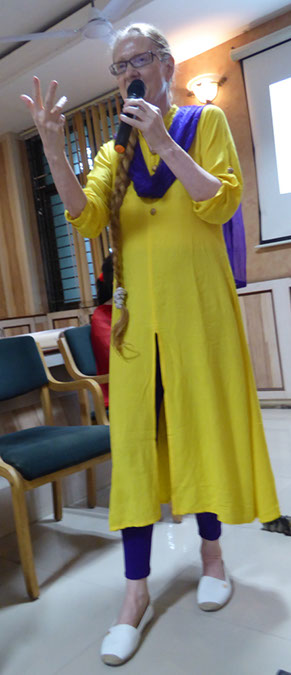
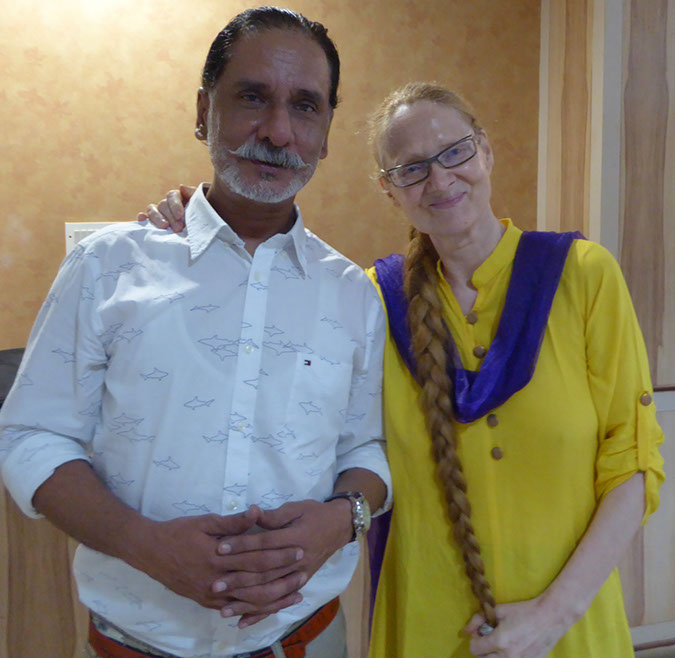
• Please click here to see the ten press photos
• Please click here to see all 189 pictures from Evelin's camera of Day One
• Please click here to see the programme for the entire conference that we created together on Day One, and all 20 Dignilogue posters
• Please click here to see the four photos Chandra Siwakoti kindly took
• Please click here to see the four photos Vinita Raj took of Evelin getting her hair in order...
• Please click here to see all 112 pictures taken by Mike Morgan througout the entire conference
• Janvi Jain Sang the Beloved Film Song 'Lag Jaa Gale' from the Movie ''Woh Kaun Thi' (Video)
Janvi Jain is a student at the Renaissance University. She sings the beloved film song 'Lag Jaa Gale' from the Movie Woh Kaun Thi. Please see also Youtube, and the lyrics of this song with English translation here.
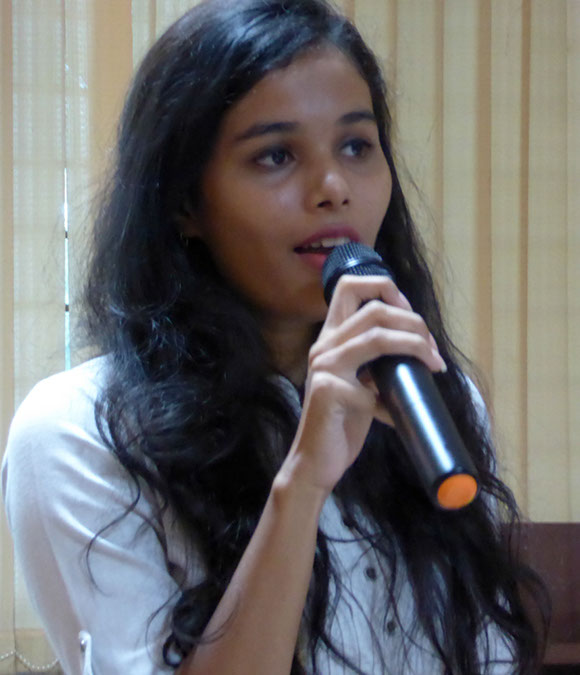
• Please click here to see the ten press photos
• Please click here to see all 189 pictures from Evelin's camera of Day One
• Please click here to see the programme for the entire conference that we created together on Day One, and all 20 Dignilogue posters
• Please click here to see the four photos Chandra Siwakoti kindly took
• Please click here to see all 112 pictures taken by Mike Morgan througout the entire conference
• Introduction into the Frame for this Conference, 'Appreciative Enquiry', by Linda Hartling, Director of Human Dignity and Humiliation Studies, Portland, Oregon (Video Particpants Watching | Video 2015 | Pdf 2014)
Linda M. Hartling, Ph.D., Director of the Human Dignity and Humiliation Studies network. Linda is also affiliated with the Jean Baker Miller Training Institute (JBMTI) at the Stone Center, which is part of the Wellesley Centers for Women at Wellesley College in Massachusetts. Until 2008, she was its Associate Director.
Linda usually sets the frame of our workshops and conferences within 'Appreciative Enquiry' that takes the best from the concept of debate, and dignifies it by placing relationships first. We create a list of agreed upon norms having to do with the nature and tone of our dialogue.
It is important to note that our appreciative frame is a HumanDHS-defined version of AI. We emphasize 'waging good conflict' (Jean Baker Miller). We believe that diverging opinions and perspectives need to be expressed and not avoided, because diversity enriches. However, diversity only enriches if embedded into mutual connection and appreciation. If not harnessed lovingly and caringly, diversity has the potential to humiliate, divide, create hostility, foster hatred, and even violence. In the spirit of our vision, we, the HumanDHS network, wish therefore to avoid the latter, and instead open a space of common ground and mutually caring connections, a space for the safe expression of even the deepest differences and disagreements, and the toughest issues of humiliation, trauma, and injustice to be aired safely.
Please see also:
• Our Appreciative Frame, created on 12th August 2012 for our 2012 Norway Conference
• Our Open Space Dignilogue Format, created on 12th August 2012 for our 2012 Norway Conference
• Our Appreciative Frame, created in December 2014 for our 2014 New York Workshop (Pdf)
• Appreciative Enquiry 4, a video that was recorded on May 27, 2015, in Portland, Oregon, USA, by Linda Hartling, for the 25th Annual Conference of Human Dignity and Humiliation Studies, in Kigali, Rwanda, June 2 – 5, 2015.
• Dignilogue Tips and Dynamic Dignilogue List, created by Linda Hartling on October 10, 2015, for the 2015 Workshop on Transforming Humiliation and Violent Conflict, in New York City, December 3 – 4, 2015.

• Please click here to see the ten press photos
• Please click here to see all 189 pictures from Evelin's camera of Day One
• Please click here to see the programme for the entire conference that we created together on Day One, and all 20 Dignilogue posters
• Please click here to see the four photos Chandra Siwakoti kindly took
• Please click here to see all 112 pictures taken by Mike Morgan througout the entire conference
• Who We Are: Our Global Dignity Family (Video)
Introduction to the Human Dignity and Humiliation Studies (HumanDHS) network and World Dignity University (WDU) initiative, by Evelin G. Lindner, Founding President of HumanDHS and Co-founder of the WDU initiative
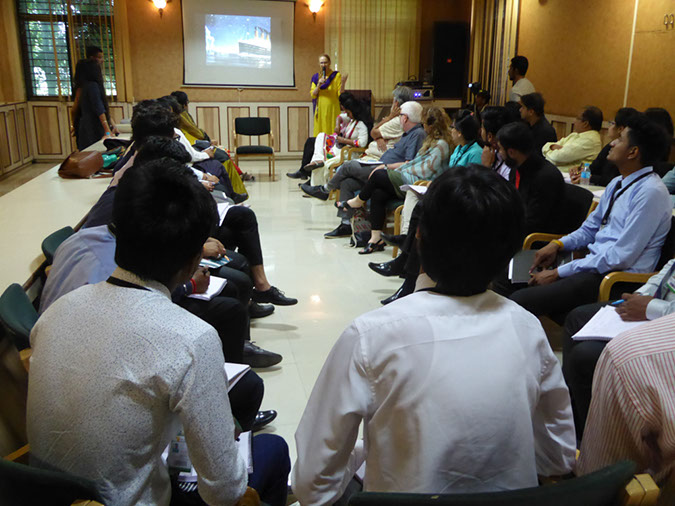
• Please click here to see the ten press photos
• Please click here to see all 189 pictures from Evelin's camera of Day One
• Please click here to see the programme for the entire conference that we created together on Day One, and all 20 Dignilogue posters
• Please click here to see the four photos Chandra Siwakoti kindly took
• Please click here to see all 112 pictures taken by Mike Morgan througout the entire conference
• Participants Got to Know Each Other (Video)
Always two participants who did not know each other (well) sat together and tried to learn as much as possible about the other in a few minutes. Then, each made a creative name tag for the other. Then each presented their conversation partner to the plenum.
• Participants Presented Their Conversation Partner to the Plenum (Video)

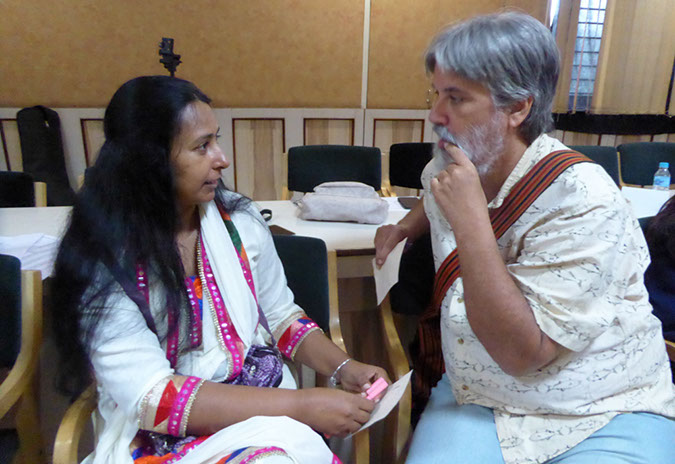



• Please click here to see the ten press photos
• Please click here to see all 189 pictures from Evelin's camera of Day One
• Please click here to see the programme for the entire conference that we created together on Day One, and all 20 Dignilogue posters
• Please click here to see the four photos Chandra Siwakoti kindly took
• Please click here to see all 112 pictures taken by Mike Morgan througout the entire conference
• A Dtudent Played the Guitar (see Video)
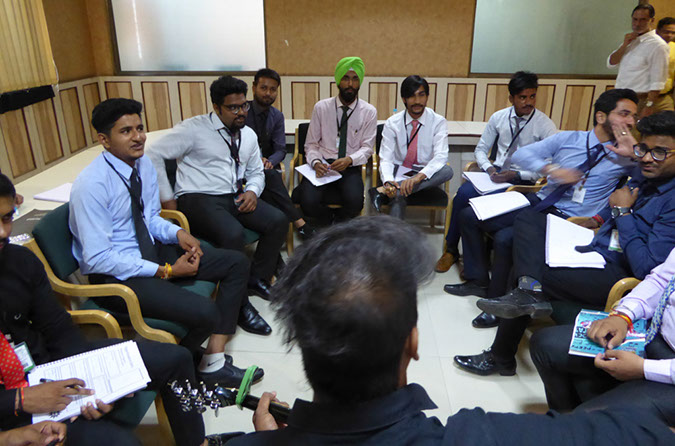
• Please click here to see the ten press photos
• Please click here to see all 189 pictures from Evelin's camera of Day One
• Please click here to see the programme for the entire conference that we created together on Day One, and all 20 Dignilogue posters
• Please click here to see the four photos Chandra Siwakoti kindly took
• Please click here to see all 112 pictures taken by Mike Morgan througout the entire conference
• Pranjali Singh Parihar Taught 'Kathak' Dance to Nira Shahaf (Video)
• Launch of the Dignilogue (Dignity + Dialogue) Sessions
• Evelin Lindner Explained the Dignilogue Format
• Linda Hartling Explained the Dignilogue Format
Created by Linda M. Hartling:
• Dignilogue: An Introduction to Dignity + Dialogue created on 31th May 2015
• Introducing the Open Space Format to the HumanDHS Network, longer version created on 13th August 2012
• Dignilogue Tips and Dynamic Dignilogue List, created on 10th October 2015 for our 2015 New York Workshop
• Our Open Space Dignilogue Format, created on 12th August 2012 for our 2012 Norway Conference
• See also A Summary of Our Dignilogue Format created in 2010 for you to download
• See also Appreciative Facilitation: Hints for Dignilogue Moderators, written in February 2006 by Judith Thompson to support the Moderators of our workshops
For the past decade, we have continuously worked to dignify the traditional institution 'conference'. The Open Space movement originally started from the observation that after mainstream academic conferences, the participants, when asked, often say: 'Oh, I slept through the presentations, but the coffee breaks were wonderful!'
In other words, the motivating impetus behind the Open Space approach is that academic conference can be rather boring; invited speakers might not be in tune with the audience; and reading papers aloud may be particularly uncommunicative. The creators of the Open Space approach thought: 'Ok, why don't we create conferences that are structured like coffee breaks!' Please read more about the originator of the Open Space Technology, Harrison Owen. See also Open Space Tools by Peggy Holman.
In slight variation of traditional conferences, we therefore aim at co-creating our conferences. We have adapted the Open Space approach, added the term dialogue, and connected it with dignity to form the expression Dignilogue (see also our Video page for how peace linguist Francisco Gomes de Matos has inspired this linguistic creation).
You can see an Introduction into the Dignilogue Sessions Format created by Linda M. Hartling on 12th August 2012, for our 2012 Norway Conference, or read more about the Dignilogue format and what it entails. See also Linda's Dignilogue Tips and Dynamic Dignilogue List, created on 10th October 2015 for the 2015 Workshop on Transforming Humiliation and Violent Conflict at Columbia University in New York City.
This format is very open, it means that a conference is self-organizing. We take a highly collaborative approach to determining how to use our time.
We invite participants to be with us without the ambition to 'present' something, so that we all could get a feel for the dignity-family-building work that we wish to nurture first and foremost. So, the workshop requires its participants to bring themselves as they are, be prepared for everything, and use the flow to contribute in the most nurturing way they can. As background reading you might enjoy 'Are College Lectures Unfair?' by Anne Murphy Paul, The New York Times, September 12, 2015, or When Nothing Is Cool by Lisa Ruddick, Criticism, 2015.
The Dignilogue approach allows for identifying priorities for dialogue sessions on key topics.
In practice, on Day One of our conference, we, the participants, make the programme for Day Two and Day Three together, in a collaborative effort. All participants are both presenters and audience, there is no separation, there is no pre-planned programme, except for the introductory part (and the Public Event). We are aware that this approach is new to most people, yet, it opens new dimensions. We invite every participant to join in and try. It has an profoundly dignifying impact and, as our participants always tell us afterwards.
The grand finale of each Dignilogue session is to invite representatives from each Dignilogue to create a Dignivideo, where they document the highlights of their conversation and insights, and more than that, formulate a 'message to the world' as it has cristallized in the dignilogue. These videos are treasured contributions to our World Dignity University Library of Ideas that will be shared with the world and will inspire future generations of our community. Please read about the way we work in our newsletter10.
There are two main ways to conduct our WDU videos:
1. Each group can choose two representatives (usually the initiator chooses one participant in the group) and they engage in a short dialogue (example). Advantage: the message may be clearer.
2. The entire group can stand in front of the camera (example). Advantage: everybody is being included.
We always encourage all participants of our events to nurture mutually dignifying connections with the other participants and gather together afterwards to experiment with new forms of 'conferencing' wherever you live in the world. New solutions are necessary and they need to be nurtured in dignified ways, ways which protect them from being destroyed by being framed in old paradigms (such as those of protest that simply ends in new dominators taking over). See our reflections on appreciative nurturing, or Charles Eisenstein's Reflections on the New Story Summit, or Evelin's text Is it Possible to 'Change the World'? Some Guidelines to How We Can Build a More Decent and Dignified World Effectively: The Case of Dignifying Abusers.
• Latest News
• Lunch


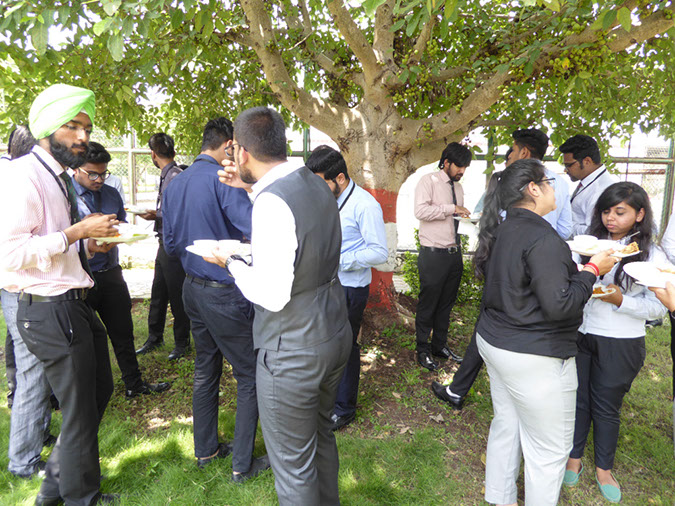


• Please click here to see the ten press photos
• Please click here to see all 189 pictures from Evelin's camera of Day One
• Please click here to see the four photos Chandra Siwakoti kindly took
• Please click here to see all 112 pictures taken by Mike Morgan througout the entire conference
• Dr. Amita Neerav Sang the Beloved Film Song 'Dil Ka Diya Jala Ke Gaya' and Then Spoke on Dignity (Video)
• Preparing the Dignilogues (Video)

• Please click here to see the ten press photos
• Please click here to see all 189 pictures from Evelin's camera of Day One
• Please click here to see the programme for the entire conference that we created together on Day One, and all 20 Dignilogue posters
• Please click here to see the four photos Chandra Siwakoti kindly took
• Please click here to see all 112 pictures taken by Mike Morgan througout the entire conference

This is the programme that we co-created on Day One for the entire three days of the workshop, adapting it flexibly throughout those days. Thank you, dear Avi Shahaf and Yashasvi Dhand, for making such a great programme poster! Please click here to see more photos.
• Dignilogue Facilitators Introduced Their Topic
See the videos of the introductions into the Dignilogues, from left top to right bottom:
• 13 Vinita Raj Explained her Dignilogue Topic
• 14 Nira Shahaf Explained her Dignilogue Topic
• 15 Mamta Siwakoti Explained her Dignilogue Topic
• 16 Mike Morgan Explained his Dignilogue Topic
• 17 Shashi Kumar Explained his Dignilogue Topic
• 18 Chandra Siwakoti Explained his Dignilogue Topic
• 19 Navneet Dubey Explained his Dignilogue Topic
• 20 Avi Shahaf Explained his Dignilogue Topic
• 21 Katyayani Singh Explained her Dignilogue Topic
• 22 Dr. Rajesh Dixit Explained his Dignilogue Topic
• 23 Donna T. Fujimoto Explained her Dignilogue Topic
• 24 Parth Jain Explained his Dignilogue Topic







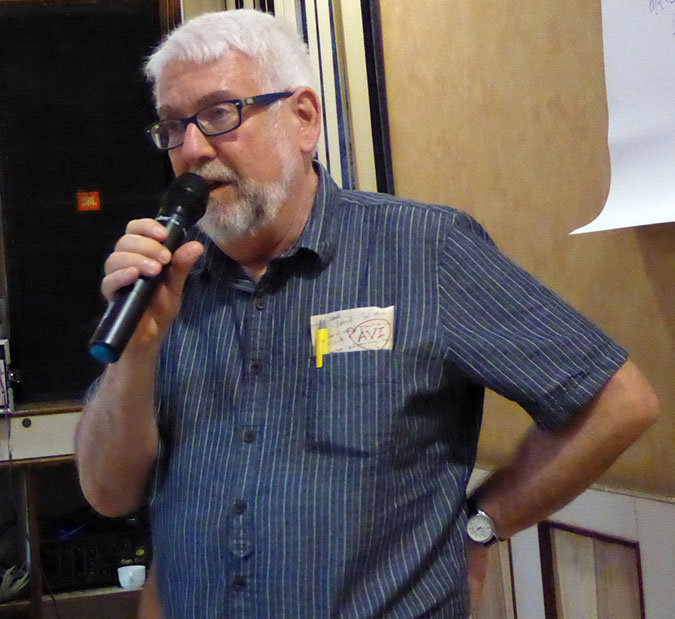




• Dr. Atul Bhat Sang Two Beloved Film Songs (Video)
• Dignilogue 1: Dignity and Humiliation (Video of the Introduction into the Dignilogue | Video of the Dignilogue | WDU message)
Vinita Raj is a coordinator at the Renaissance-Indira Group of Institutions.
The following Dignilogue topics had been suggested prior to the conference, yet, due to various reasons, did not materialise:
• Humiliation - An Extreme Emotion Leading to Extreme Behavior? Understanding the Victim Agency and Choice
Yashpal Jogdand is Assistant Professor in the Department of Humanities and Social Sciences, Indian Institute of Technology Delhi. Yashpal’s research interest lie at the intersection of social and political psychology. He is particularly interested in studying how people experience (e.g. stigma, discrimination, stereotype threat, shame, rejection, humiliation) and manage/challenge (e.g. by engaging in false consciousness, individual mobility, social creativity, collective action) the issues arising from devalued identity.
Abstract: Humiliation - an extreme emotion leading to extreme behavior? Understanding the victim agency and choice, social psychological research conceptualizes humiliation as an extreme and intense emotion which instigates extreme and irrational behaviors. Victims of humiliation are portrayed as lacking rational control and prone to violent, vengeful actions. I contest this view of humiliation and its victims. I argue that these intense/extreme accounts present a narrow view of humiliation and ignore its inherently relational or dynamic nature. Importantly, these accounts pathologise victims and undermine their efforts to manage/challenge humiliation in everyday life. I present data from several studies employing different methods (thematic analysis, experiments, and discourse analysis). These studies examined the experience and response to humiliation among Dalits (ex-Untouchables) in India (and also among university students in UK for comparative purposes). I show that humiliation is, in fact, a social encounter within power relations. The nature of humiliation and how it is experienced depends upon the way in which identities are defined in a humiliating encounter. If identities are defined on a group level, people can feel humiliated simply by witnessing humiliation of another group member. Furthermore, the studies also revealed that victims do not remain passive during humiliating encounters but possess the choice and agency to affect the outcome of these encounters. Finally, the way in which humiliating encounters are resolved depend upon the mobilisation processes which can even change the nature of identities and, therefore, the nature of experience of the encounter.
• Global Peace, Dignity & Sustainability for Sustainable Future
Prof. Dr. Subhash Chandra is Associate Professor (Hon.) at the Intercultural Open University (IOU), NL, and GHA Ambassador of Peace and Disarmament from Harmony in India: 'Dignity means a sense of self-respect and self-worth, physical and psychological integrity and welfare of humankind'.
Abstract: The world has been transformed into a global village. Globalization is having a major impact not only on the business world but also on the whole humanity. Globalization is the process by which all peoples and communities come to experience an increasingly common economic, social and cultural environment for creating common good for all. Is Globalization good or bad? Global recession, poverty, conflict & violence, climate change and human rights & human dignity became the most important challenges due to the process of Globalization in 21st century. [read more]
• Gender Equality, Dignity and Women’s Empowerment
Ls Ashok Bala, Chartered President of the Lioness Club International, NewDelhi, India, and Project Secretary (Hon.) of the World Peace & Cultural Centre (WPCC) in Ujjain, India: 'Dignity means a sense of self-respect and self-worth, physical and psychological integrity and women’s empowerment for myself and for all others in the society'.
Abstract: Our modern society is driven by a culture of violence & materialism while the whole of human life is in a state of turmoil due to conflicts, violence& intolerance in the society. At present, we are living in fast changing, modernizing and globalizing society with mix population – different religions, race, culture, faith, etc. in modern age which is known as age of materialism and globalization in 21st century. [read more]
• Workplace Bullying: Clinical and Organizational Perspectives
Dr. Judith Balcerzak, MSW, PhD, LCSW, author of the 2015 book Workplace Bullying: Clinical and Organizational Perspective: Dignity means respect and tolerance for others whether those others are like us or not. It includes treating others as we would like to be treated and embracing diversity. Dignity includes compassion for those who have not been as fortunate as we have been. Finally, dignity means freedom from fear of humiliation, degradation, harassment, and discrimination.
• Madness-in-Dignity and Dignity-in-Madness: Transforming Madness for Dignified Existence
David Yau Fai Ho and Irene Ng
By the blessing of circumstance, David Yau Fai Ho is a passionate author. In separation, being a professor of clinical psychologist steeped in a bilingual-bicultural background, experiencing glimpses of enlightenment, or having episodes of 'madness' may not be that uncommon. But the confluence of all these is rare, if not unique.
What has madness got to do with dignity? This Dignilogue will serve to provide an answer: Everything! The world has long wanted to expunge madness from dignified existence. But is it possible? And even if the answer is yes, which I doubt, is it desirable? First we must make a distinction between malignant versus benign madness. Malignant madness causes suffering to the sufferer and those around him. If wedded to evil, as in the case of Hitler and his gang of psychopaths, it has no redeeming value; it serves only to magnify suffering and threaten dignity. Benign madness is devoid of evil and may be harnessed to enhance dignified existence. How? I will draw on my first-hand experiences to illustrate how this may be done. These experiences are described in Enlightened or Mad? A Psychologist Glimpses in Mystical Magnanimity published by Dignity Press in 2014.
Irene Ng is a specialist in children’s literature. What better way is there to nurture dignity than to begin early in life, she asks? Irene has heard a great deal of lofty things about the HDHS group from David Ho. Naturally, she is eager to meet these DigniFriends with anticipation.
• DigniDance
David Yau Fai Ho and Irene Ng
By the blessing of circumstance, David Yau Fai Ho is a passionate author. In separation, being a professor of clinical psychologist steeped in a bilingual-bicultural background, experiencing glimpses of enlightenment, or having episodes of 'madness' may not be that uncommon. But the confluence of all these is rare, if not unique.
Originally trained under a professional DanceMoverment therapist, David has branched out to develop what he calls Dynamic Relaxation and Meditation (DRM) in recent years. DRM integrates music, movement, dance, meditation, Chinese qigong and martial arts into a unique method for promoting health in mind, body, and spirit (also described in Enlightened or Mad?). In this presentation, David will perform his interpretive DigniDance to music that dignifies the soul. (The presentation may be as short as 5-15 minutes. The equipment required must include a CD player. I will bring my own CDs. The venue has to be “big enough” to accommodate a dance performer.)
Please see: Expressive Dance to Music: A Royal Road to Holistic HealthEnd of Day One
Thursday, 17th August 2017, Workshop Day Two
Welcome
This is the programme that we co-created on Day One for the entire three days of the workshop, adapting it flexibly throughout those days. Thank you, dear Avi Shahaf and Yashasvi Dhand, for making such a great programme poster! Please click here to see more photos.
• Please click on the photo above or here to see all 254 pictures from Evelin's camera of Day Two
• Please click here to see the 197 photos that Amit Singh kindly took
• Please click here to see all 112 pictures taken by Mike Morgan througout the entire conference!• Dignilogue 2: Human Dignity Advancement in Organisations (Video of the Introduction into the Dignilogue on Day One | Video of the Dignilogue | WDU Message)
How can we enroll more and more organisations all over the world to be more aware and committed to the value of human dignity, and to agree to invest resources in programmes whose aim is to advance human dignity?
How can we make the challenge of taking human dignity more attractive to managers?Avi Shahaf was born (1951) and raised in Tel Aviv, Israel. He completed his BA in Sociology and Anthropology and his MA in Organizational Development – both in Tel Aviv University. Avi Shahaf has been dedicating most of his adult life to working as an organizational consultant who specializes in facilitating processes for advancing human dignity in different organizations. For seven years, Avi managed an institute which focused on the development of managers and workers handling youth at risk. [read more]
• The Participants Thanked Nira and Avi Shahaf
• Please click here to see all 254 pictures from Evelin's camera of Day Two
• Please click here to see the 197 photos that Amit Singh kindly took
• Please click here to see all 112 pictures taken by Mike Morgan througout the entire conference!• Latest News
• Lunch

• Please click here to see all 254 pictures from Evelin's camera of Day Two
• Please click here to see the 197 photos that Amit Singh kindly took
• Please click here to see all 112 pictures taken by Mike Morgan througout the entire conference!• Dignilogue 3: Who Gets to Say Who I Am? Identity and Dignity (Deaf and Other Perspective) (Video of the Introduction into the Dignilogue on Day One | Video of the Dignilogue | WDU Message with Dr. Rajesh Dixit | WDU Message with Evelin Lindner)
Michael W. Morgan has been involved with helping the Deaf to get access to university-level courses in India, Ethiopia, and elsewhere. He is proud of having been able to help in the Supreme Court case in Nepal giving the Deaf the right to obtain a drivers' license. He gave us 'hearing' people a sense of the Deaf culture, and the challenges they face. [read more]
• Dignilogue 4: Intercultural Communication Awareness Raising (Video of the Introduction into the Dignilogue on Day One | Video of the Dignilogue | WDU Message)
Donna Fujimoto is Associate Professor at Osaka Jogakuin College in Osaka, Japan where she teaches English as a Foreign Language, Intercultural Communication and Human Rights courses. She was born in the U.S. and has lived in Japan for over 26 years, and this experience prompted her to organize a study group of other long-term Nikkei residents of Japan (Nikkei means people of Japanese heritage). Donna has been in the field of English as a Foreign Language (EFL) for over 30 years, and she has an M.A. from the Department of Second Language Studies, University of Hawaii, and is a doctoral candidate at Temple University, Japan. She is the Chair of the Intercultural Communication Interest Section of TESOL (Teachers of English to Speakers of Other Languages), Co-Publicity Chair for the Pragmatics Special Interest Group of JALT (Japan Association of Language Teaching), Co-Program Chair of SIETAR Kansai chapter (Society of Intercultural Education, Training and Research), and Coordinator of the Contrast Culture Method, an intercultural training group. She is currently involved in research on Conversation Analysis, Nikkei-related topics, Intercultural Communication and issues about racism and teachers in Japan. [read more]
• Donna T. Fujimoto sang a Japanese Song (Video)
• Please click here to see all 254 pictures from Evelin's camera of Day Two
• Please click here to see the 197 photos that Amit Singh kindly took
• Please click here to see all 112 pictures taken by Mike Morgan througout the entire conference!
• The Students Sang a Punjabi Folk Song (Video)
• Please click here to see all 254 pictures from Evelin's camera of Day Two
• Please click here to see the 197 photos that Amit Singh kindly took
• Please click here to see all 112 pictures taken by Mike Morgan througout the entire conference!
• Dr. Atul Bhat Sang a Beloved Film Song (Video)
• Please click here to see all 254 pictures from Evelin's camera of Day Two
• Please click here to see the 197 photos that Amit Singh kindly took
• Please click here to see all 112 pictures taken by Mike Morgan througout the entire conference!• The Students Were Singing (Video)
• Please click here to see all 254 pictures from Evelin's camera of Day Two
• Please click here to see the 197 photos that Amit Singh kindly took
• Please click here to see all 112 pictures taken by Mike Morgan througout the entire conference!• Dignilogue 5: Studies on Setting up a Nonkilling Index as an Approach to Nonviolence and Global Peace (Video of the Introduction into the Dignilogue on Day One | Video of the Dignilogue | WDU Message | Pdf)
Katyayani Singh is a research scholar pursuing research on the topic of nonkilling under the guidance of Prof. Dr. Anoop Swarup. See her Appreciative Introduction. Prof. Dr. Anoop Swarup builds on the work of Glenn D. Paige. She particularly needs the opinions of peace activists/peace thinkers. It would be of great help to her if interested peace thinkers were to fill out the survey.
Abstract: The genesis of this research in setting up a nonkilling global index has its roots in the Nonkilling paradigm, a unique approach to universal nonviolence and peace elaborated by Late Dr. Glenn D. Paige in his seminal work Nonkilling Global Political Science (2009). [read more]• Dr. Atul Bhat Sang Another Beloved Film Song (Video)
• Please click here to see all 254 pictures from Evelin's camera of Day Two
• Please click here to see the 197 photos that Amit Singh kindly took
• Please click here to see all 112 pictures taken by Mike Morgan througout the entire conference!• Mahendra Sharma and Anoop Swarup Visited (Video)
Mahendra Sharma is a poet, and director of the Renaissance-Indira Group.
Thank you for bringing us your wonderful poetry, dear Mahendra Sharma!Professor Dr. Anoop Swarup is Vice Chancellor at Shobhit University in Bophal, India. He is the recipient of the Presidential Award on Republic Day of India, 2003, and has extensive experience of over 30 years in key positions in public, private and not for profit sectors, including with the General Insurance Corporation (GIC) posted at Mumbai, Chandigarh, Kanpur, Bhopal, and London, the Indian Revenue Service (IRS) in 1985, Monash University in 2006 and UNSC at United Nations (UN) in 2007. Prof. Dr. Anoop Swarup builds on the work of Glenn D. Paige.
See Glenn Paige in our 2009 Dignity Conference in Hawai'i. We deeply honour his memory!
'A nonkilling shift simultaneously introduces concern for the whole and for the individual in international politics. The basic unit of nonkilling political analysis is the individual human being'. Glenn D. Paige (2009). Nonkilling Global Political Science, Center for Global Nonkilling, Hawai'i, USA.
• Please click here to see all 254 pictures from Evelin's camera of Day Two
• Please click here to see the 197 photos that Amit Singh kindly took
• Please click here to see all 112 pictures taken by Mike Morgan througout the entire conference!


Thank you, dear Professor Swarup, for your wonderful gift of two important and lovely books!
1. Swarup, Anoop (Ed.), Give Nonviolence a Chance: The Journey of Neelakanta Radharkrishnan. New Delhi, Seattle: Konark
2. A book in Hindi titled Self-Meditation and Self-Expression
End of Day Two
Friday, 18th August 2017, Workshop Day Three
Welcome
This is the programme that we co-created on Day One for the entire three days of the workshop, adapting it flexibly throughout those days. Thank you, dear Avi Shahaf and Yashasvi Dhand, for making such a great programme poster! Please click here to see more photos.
• Please click here to see all 344 pictures from Evelin's camera of Day Three
• Please click here to see the 229 photos that Amit Singh kindly took
• Please click here to see all 112 pictures taken by Mike Morgan througout the entire conference!• Dignilogue 6: Mamta Siwakoti
Humiliation and Dignity: Absolute and Universal or Relative in Nature (Video of the Introduction into the Dignilogue on Day One | Video of the Dignilogue | WDU Message)
• Chandra Siwakoti
Human Dignity and Humiliation:
1. Minimizing/Reducing/Eliminating Humiliation and Protecting, Respecting, and Promoting Dignity
2. Dignity Is the Worth of Human Value
3. Dignity Is Protecting Human Behaviour
4. Self-Realisation
5. Not Harm Others
Mamta Siwakoti is a law student in her final year in the Kathmandu School of Law. See Mamta Siwakoti's Appreciative Introduction. Mamta is the daughter of Chandra Prasad Siwakoti, a human rights lawyer from Nepal. Both came together to the conference. See Chandra Siwakoti's Appreciative Introduction.
• Dignilogue 7: Love, Poerty and Arts Make the World Dignified (Video of the Introduction into the Dignilogue on Day One | Video of the Dignilogue | WDU Message Hindi | WDU Message English)
• Dr. Rajesh Dixit is a poet, and the Principal of the Rennaissance College.
'Message to the World' for the World Dignity University (WDU) Initiative, Dr. Rajesh Dixit and Dr. Amita Neerav Hindi / English (recorded on 17th September 2017)
• Dignilogue 8: Problem of Manual Scavengers in India: The Story of Humiliation from Kanpur City (Video of the Introduction into the Dignilogue on Day One | Video of the Dignilogue Part 1 / Part 2 | Power Point | WDU Message)
Dr. Shashi Kumar is Assistant Professor at the Department of Human Rights, School For Legal Studies, of Babasaheb Bhimrao Ambedkar University, Lucknow, India. To him, dignity means 'human respect and protection of human rights and moral values. Free from humiliation and discrimination'.
• Lunch


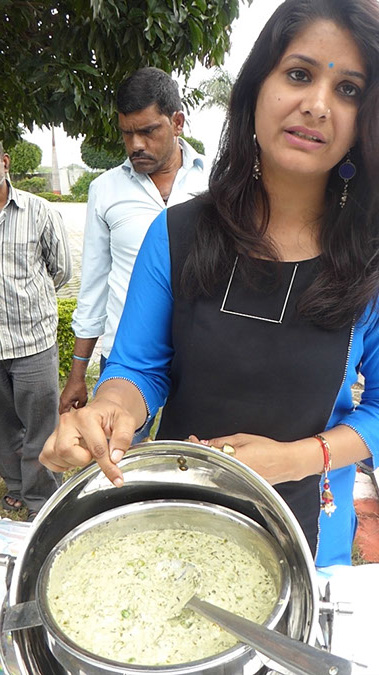


You see from left to right the most delicious vegetarian dishes! Thank you, dear Sunita Kasliwal, for explaining! Please click on the pictures to see the exlanations!
(1) shahi paneer masala, (2) white gravy paneer masala, and (3) yellow pulses
• Please click here to see all 344 pictures from Evelin's camera of Day Three
• Please click here to see the 229 photos that Amit Singh kindly took
• Please click here to see all 112 pictures taken by Mike Morgan througout the entire conference!• The Students Received Chocolate! (Video)
• Dignilogue 9: The Linkage Between Movement and Dignity (Video of the Introduction into the Dignilogue on Day One | Video of the Dignilogue itself inside the conference room | outside of the conference room)
Nira Shahaf is a dance therapist and psychotherapist in Israel. She came with her husband Avi Shahaf, the Director of Efshar - Organizational Development and Training, an organizational consultation company in Israel that facilitates human dignity advancement programs in organizations.
• Pranjali Singh Parihar Taught 'Kathak' Dance to Nira Shahaf (Video)
• Mamta Siwakoti Sang a Nepalese Song (Video)
• The Students Were Singing (Video)
• Nira and Avi Shahaf Sang a Song from Israel (Video)
• Dignilogue 10: Navneet Dubey: Why Does Everyone Behave So Different with Each Other? (Video of the Introduction into the Dignilogue on Day One)
• Parth Jain: Why Is Dignity Becoming Ego Nowadays? Impact of This on Society (Video of the Introduction into the Dignilogue on Day One | Video of the Dignilogue itself)Parth Jain and Navneet Dubey are part of the International Batch of Students of Post Graduate Diploma in Management at the Indore-Indira Business School.
• Saying Good-Bye to Nira and Avi Shahaf (Video)
• Swapnil Kothari Visited with His Students (Video)
• Evelin Lindner's Comments (Video)
• Swapnil Kothari's Comments (Video)
• Amol Mishra Rounded Up Day Three (Video)
End of Day Three
Public Function
Venue: Renaissance University, Sanwer Road, behind Aurobindo hospital, Gram Reoti, Indore-452015 (see map)
We will explore the urgent need for dignity in an age of globalisationOn GANDHi's Unique History-Changing Intent
Peace linguist Francisco Gomes de Matos from Recife, Brazil, Co-founder of ABA Global Education and author of Dignity - A Multidimensional View, in Dignity Press, 2013, sent this plea as a gift to the conference participants on 12th August 2017:
What was GANDHI's unique intent?
Resistance, creative and nonviolent
National dignity it helped implement
FREEDOM it was able to reinvent
To Human Rights it gave an ascent
Solidarity became a global sentiment
The power of peaceful language was evident
May all of Humankind, GANDHI's legacy orient

• Welcoming Everybody to the Public Event of Our Conference (Video)
• Amol Mishra opened the Public Function as representative of the Renaissance University, the host, convener, and organiser of the conference (Video)
• Swapnil Kothari greeted everybody as the Founder and Group Chairman of the Renaissance University, the host, convener, and organiser of the conference (Video)
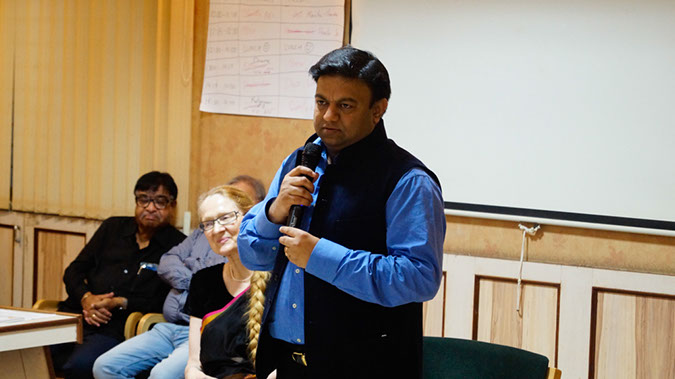
• Please click here to see all 82 pictures from Evelin's camera of Day Four
• Please click here to see the 216 photos that Amit Singh kindly took
• Please click here to see all 112 pictures taken by Mike Morgan througout the entire conference• Dignity in Times of Globalisation (Video)
Evelin Lindner, Founding President of Human Dignity and Humiliation Studies, and Co-Founder of the World Dignity University initiative
• Please click here to see all 82 pictures from Evelin's camera of Day Four
• Please click here to see the 216 photos that Amit Singh kindly took
• Please click here to see all 112 pictures taken by Mike Morgan througout the entire conference• The Renaissance University Honoured the Participants Who Came from Afar
These are the Appreciative Introductions of the participants





Please click on the images above or here to see all Introductions (with the contact information blackened for the protection of privacy)See the videos of the Renaissance University honouring the participants who came from afar:
• 64 Honouring Donna T. Fujimoto
• 65 Honouring Mike Morgan
• 66 Honouring Chandra and Mamta Siwakoti
• 67 Honouring Shashi Kumar
• 68 Honouring Dr. Amita Neerav
• 69 Honouring Dr. Rajesh Dixit
• 70 Honouring Vinita Raj
• 72 Honouring Evelin Lindner• The Renaissance University Honoured the International Batch of Students of Post Graduate Diploma in Management Who Had Participated (Video)
Nikita Sukhyani, Md. Anas Khan, Navneet Dubey, Anand Chawla, Kushagra Agrawal, Nazeem Sheikh, Lokendra Singh Pawar, Raj Singh Rajawat, Sagar Jaiswal, Robin Raju, Pooja Shilaka, Darshana Parmar, Hina Grover, Parth Jain, Balvinder Singh Gambhir, Shyam Singh Chauhan, Gaurav Yadav, Rahul Padiyar, Mustafa Dharwala, Palash Ukey, Vishal Aldak

















Please click on the images above or here to see all Introductions (with the contact information blackened for the protection of privacy)

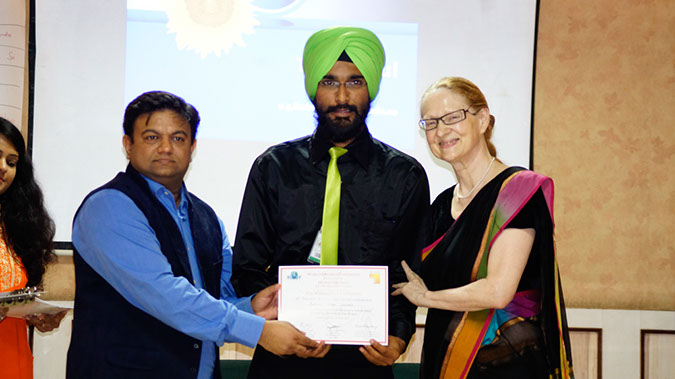

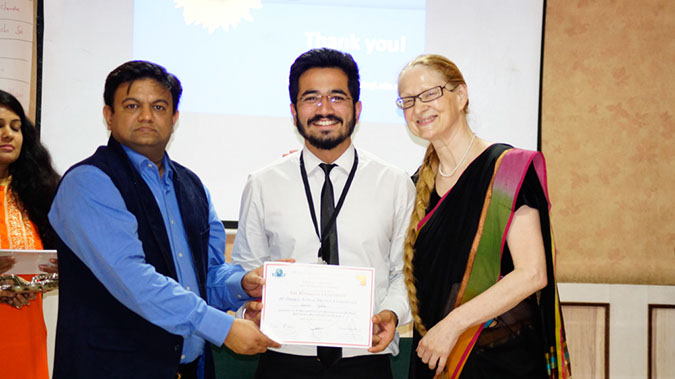
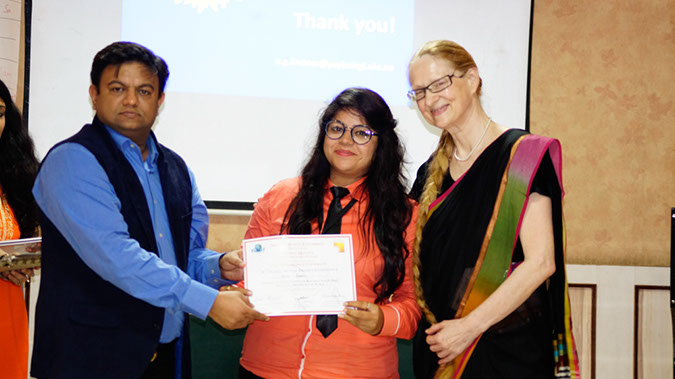

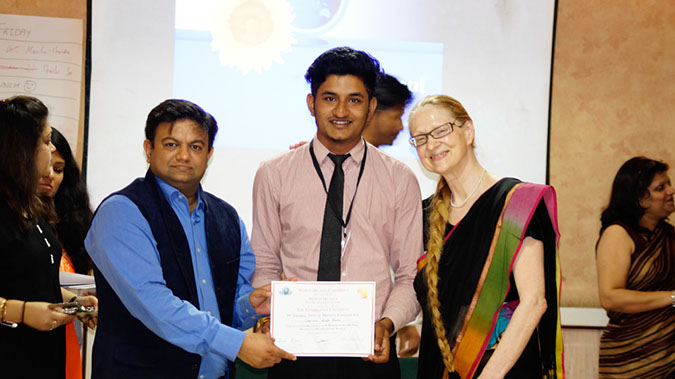


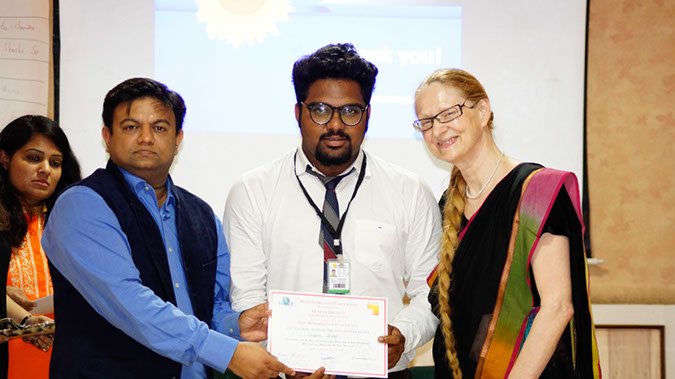

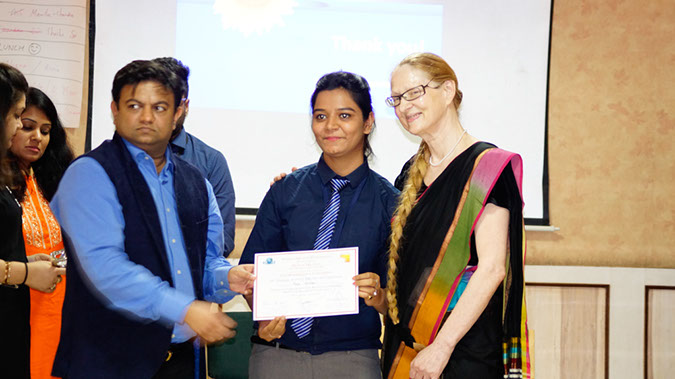

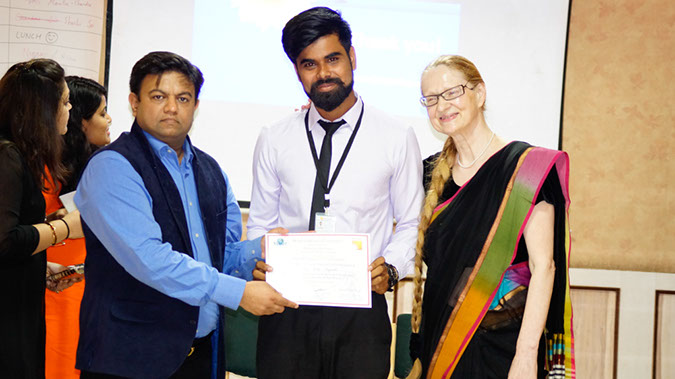

• Please click here to see all 82 pictures from Evelin's camera of Day Four
• Please click here to see the 216 photos that Amit Singh kindly took
• Please click here to see all 112 pictures taken by Mike Morgan througout the entire conference• The Renaissance University Honoured the Students of the Renaissance College Who Had Supported the Conference (Video)
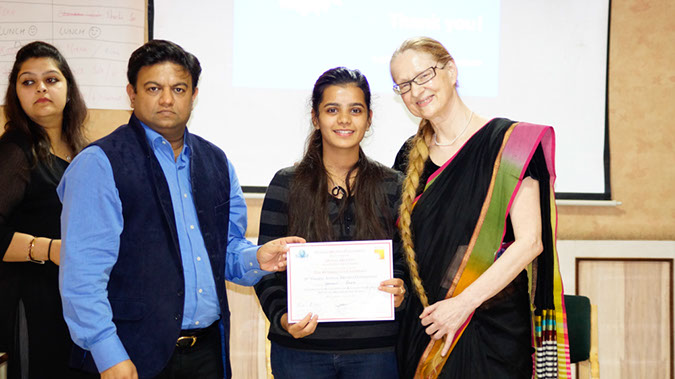
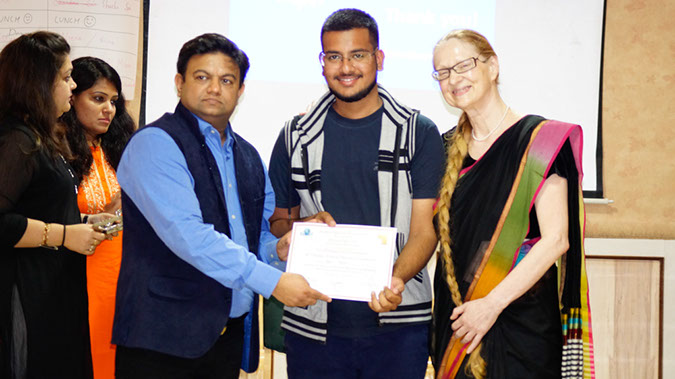
• Please click here to see all 82 pictures from Evelin's camera of Day Four
• Please click here to see the 216 photos that Amit Singh kindly took
• Please click here to see all 112 pictures taken by Mike Morgan througout the entire conference
• The Human Dignity and Humiliation Studies Network Honoured Participants
See the videos of the Human Dignity and Humiliation Studies Network honouring participants:
• 73 Honouring Amol Mishra
• 74 Honouring Swapnil Kothari
• 75 Honouring Dr. Amita Neerav and Dr. Rajesh Dixit
• 76 Honouring Vinita Raj
• 77 Honouring Pooja Upadhaya Vyas
• 78 Honouring Sarabjeet Singh Bharaj (also on 27th September 2017!)
• 79 Honouring DeepakTripathi
• 80 Honouring Menika Soni Jadon
• 81 Honouring Rachana Ghadge• Saying Good-Bye
• Amol Mishra Sang a Beloved Film Song (Video)
• Please click here to see all 82 pictures from Evelin's camera of Day Four
• Please click here to see the 216 photos that Amit Singh kindly took
• Please click here to see all 112 pictures taken by Mike Morgan througout the entire conference• Dr. Amita Neerav Sang Beloved Film Song 'Kisi Ki Yaad Mein Dunia Ko Hai Bhilaaye Hue' (Video)
• Please click here to see all 82 pictures from Evelin's camera of Day Four
• Please click here to see the 216 photos that Amit Singh kindly took
• Please click here to see all 112 pictures taken by Mike Morgan througout the entire conference
Please click here to see all 82 pictures from Evelin's camera of Day Four
• Please click here to see the 216 photos that Amit Singh kindly took
• Please click here to see all 112 pictures taken by Mike Morgan througout the entire conference
Closing of the Public Funtion with a Wonderful Lunch
List of Participants
If you wish to participate in future conferences, please email us!Still photos
The still photos come in several web galleries. We so much thank Amit Singh, Donna T. Fujimoto, Amita Neerav, Mike Morgan, Suraj Pillai, and many others for taking such lovely photos!
Day One, Wednesday, 16th August 2017
• Please click here to see the ten Press photos
• Please click here to see all 189 pictures from Evelin's camera of Day One
• Please click here to see the programme for the entire conference that we created together on Day One, and all 20 Dignilogue posters
• Please click here to see the four photos Chandra Siwakoti kindly took
• Please click here to see the four photos Vinita Raj took of Evelin getting her hair in order...
Day Two, Thursday, 17th August 2017
• Please click here to see all 254 pictures from Evelin's camera of Day Two
• Please click here to see the 197 photos that Amit Singh kindly took
Day Three, Friday, 18th August 2017
• Please click here to see all 344 pictures from Evelin's camera of Day Three
• Please click here to see the 229 photos that Amit Singh kindly took
Day Four, Saturday, 19th August 2017
• Please click here to see all 82 pictures from Evelin's camera of Day Four
• Please click here to see the 216 photos that Amit Singh kindly took
All of the conference
• Please click here to see all 112 pictures taken by Mike Morgan througout the entire conference• Dr. Deepak Tripathi
Deepak Tripathi was the inspirer of this conference. Please see his book A Journey through Turbulence in Dignity Press. See also his 2013 book Imperial Designs: War, Humiliation and the Making of History (Washington, DC: Potomac).• Swapnil Kothari
Swapnil Kothari is the Founder and Chairman of the Renaissance-Indira Group of Institutions, with the Renaissance University as a new addition since the month of August 2017. Congratulations! This conference was the first event of this university. On the fourth day of the conference, on 19th August 2017, the Human Dignity and Humiliation Studies network honoured Swapnil Kothari for his dignified and dignifying generosity in hosting this conference.• Sarabjeet Singh Bharaj
Sarabjeet Singh Bharaj is the Chief Executive Officer and Director of the Renaissance-Indira Group of Institutions.

This photo was taken on 26th July 2017• Amol Mishra
Amol Mishra is the Director of Public Relations at the Renaissance-Indira Group of Institutions.• Dr. Rajesh Dixit
Dr. Rajesh Dixit is a poet, and the Principal of the Rennaissance College.


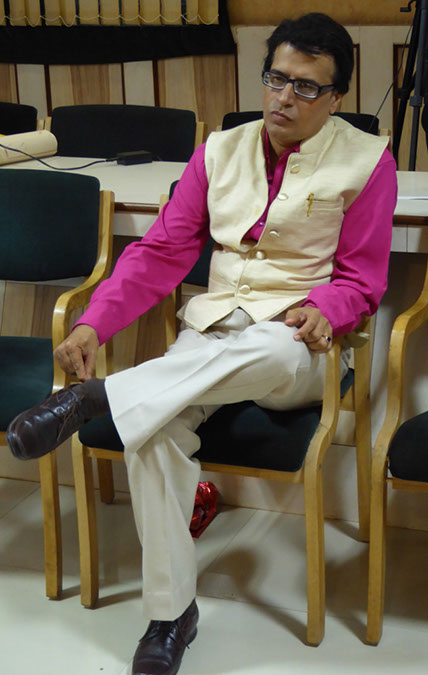
Thank you, dear Dr. Rajesh Dixit, for translating several of the poems we have gathered on our Quotes page into Hindi!
Here is Practicing the Complex Yes by Kim Stafford:
• Dr. Amita Neerav
Dr. Amita Neerav is a thinker, author, blogger, and journalist at NaiDunia, Indore, India.• Avi Shahaf and his wife Nira Shahaf
Avi Shahaf is the Director of Efshar - Organizational Development and Training, an organizational consultation company in Israel that facilitates human dignity advancement programs in organizations.Nira Shahaf is a dance therapist and psychotherapist.
• Donna T. Fujimoto
Donna T. Fujimoto is Associate Professor at Osaka Jogakuin College in Osaka, Japan.• Mike Morgan
Mike Morgan has been involved with helping the Deaf to get access to university-level courses in India, Ethiopia, and elsewhere. He is proud of having been able to help in the Supreme Court case in Nepal giving the Deaf the right to obtain a drivers' license. He gave us 'hearing' people a sense of the Deaf culture, and the challenges they face.• Chandra Prasad Siwakoti
Chandra Prasad Siwakot is a human rights lawyer from Nepal, and he came with his daughter Mamta Siwakoti, a law student in her final year in the Kathmandu School of Law. See Chandra Siwakoti's Appreciative Introduction.• Mamta Siwakoti
Mamta Siwakoti is a law student in her final year in the Kathmandu School of Law. See Mamta Siwakoti's Appreciative Introduction.• Prof. Dr. Anoop Swarup
Prof. Dr. Anoop Swarup is Vice Chancellor at Shobhit University in Bophal, India. He is the recipient of the Presidential Award on Republic Day of India, 2003, and has extensive experience of over 30 years in key positions in public, private and not for profit sectors, including with the General Insurance Corporation (GIC) posted at Mumbai, Chandigarh, Kanpur, Bhopal, and London, the Indian Revenue Service (IRS) in 1985, Monash University in 2006 and UNSC at United Nations (UN) in 2007. Prof. Dr. Anoop Swarup builds on the work of Glenn D. Paige.



Thank you, dear Professor Swarup, for your wonderful gift of two important and lovely books!
1. Swarup, Anoop (Ed.), Give Nonviolence a Chance: The Journey of Neelakanta Radharkrishnan. New Delhi, Seattle: Konark
2. A book in Hindi titled Self-Meditation and Self-Expression
See Glenn Paige in our 2009 Dignity Conference in Hawai'i. We deeply honour his memory!
'A nonkilling shift simultaneously introduces concern for the whole and for the individual in international politics. The basic unit of nonkilling political analysis is the individual human being'. Glenn D. Paige (2009). Nonkilling Global Political Science, Center for Global Nonkilling, Hawai'i, USA.
• Mahendra Sharma
Mahendra Sharma is a poet, and director of the Renaissance-Indira Group• Katyayani Singh
Katyayani Singh is a research scholar pursuing research on the topic of nonkilling under the guidance of Prof. Dr. Anoop Swarup. See her Appreciative Introduction. Prof. Dr. Anoop Swarup builds on the work of Glenn D. Paige. She particularly needs the opinions of peace activists/peace thinkers. It would be of great healp to her if interested peace thinkers were to fill out the survey.• Dr. Shashi Kumar
Dr. Shashi Kumar is Assistant Professor at the Department of Human Rights, School For Legal Studies, of Babasaheb Bhimrao Ambedkar University, Lucknow, India. See his Appreciative Introduction.• Vinita Raj
Vinita Raj is a coordinator at the Renaissance-Indira Group of Institutions.See also the wonderful poem that Vinita Raj's husband Dr. Rajkumar Arunachalam shared with us. She kindly wrote (on 19th August 2017): Dear Evelin, Here is the poem that my husband wrote and which matches your concept of living globally. However he could extend it to whole of India, despite so much of diversity. Name is of India but feelings in the poem are universal. He had a great wish that it should be read to you. Thanks & Regards. Vinita Raj
This picture with dear Vinita and her husband was taken on 29th July 2017. See also Facebook.
'WE ARE INDIA'
We are not proud to be an Indian!
We are proud of ourselves!
We are not proud of our language.
We are proud of whatever we speak.
We are not proud of our religion.
We are proud of whatever we realize.
We are not proud of our native place.
We are proud of the place wherever we live.
We are not proud of our customs and practice.
We are proud of whatever we practice.
Those differences never drove our journey.
Those passions always held us in our journey.
Life and Land are indeed interrelated.
Life may come from a different world.
But the Material Substance for Life comes
from the Soil and Sand of this land.
Everyone is made up of Soil and Sand from their land.
Being genuine to ourselves means genuine to our land too.
Being proud of ourselves means proud of our land too.
That is why?
We are not proud to be an Indian.
We are proud of ourselves.
We are proud to be a tiny part of India.
And we are India!
Happy Independence Day 'INDIA'!
- Raj
Dr. Rajkumar Arunachalam
NOTE: WE included (Vinita, Kaelyn & Raj)• Dr. Atul Bhat
Dr. Atul Bhat is a dentist and an accomplished singer. He was kindly brought to the conference by Vinita Raj.• Dr. Rachana Ghadge
is part of the faculty at the Renaissance College.• Pooja Upadhaya Vyas
Pooja Upadhaya Vyas is part of the faculty at the Renaissance College.• Pranjali Singh Parihar
Pranjali Singh Parihar is a student at the Renaissance College, kindly offering her support to the conference.• Yashasvi Dhand
Yashasvi Dhand is student at the Renaissance College, who kindly offered her support to all participants.• Tejas Kumar
Tejas Kumar is a student at the Renaissance College, who kindly offered his support to all participants.The International Batch of Students of Post Graduate Diploma in Management who participated (Video)
See the Appreciative Introductions of Nikita Sukhyani, Md. Anas Khan, Navneet Dubey, Anand Chawla, Kushagra Agrawal, Nazeem Sheikh, Lokendra Singh Pawar, Raj Singh Rajawat, Sagar Jaiswal, Robin Raju, Pooja Shilaka, Darshana Parmar, Hina Grover, Parth Jain, Balvinder Singh Gambhir, Shyam Singh Chauhan, Gaurav Yadav, Rahul Padiyar, Mustafa Dharwala, Palash Ukey, Vishal Aldak
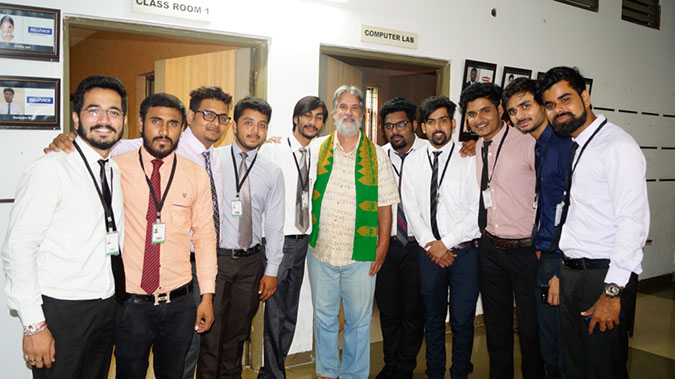
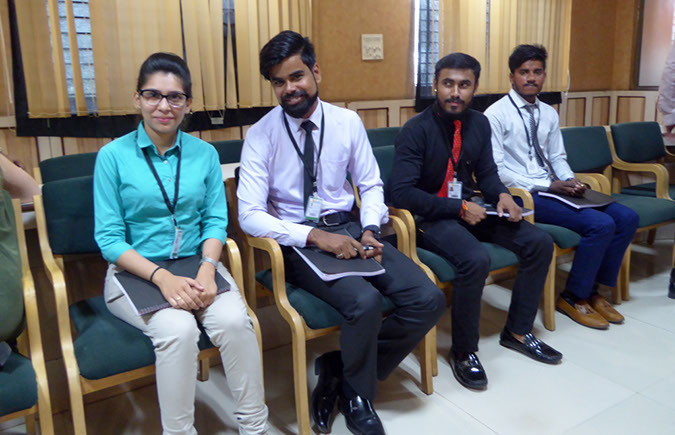


















Please click on the images above or here to see all Introductions (with the contact information blackened for the protection of privacy)They were unfortunately hindered to be with us
• Sonalee Nargunde, professor in mass communication department at the State University of Indore, the Devi Ahilya Vishwavidyalaya University. She is the first PhD in media in Madhya Pradesh.
• Vani Chaturvedi, student of interior design
• Yashpal Jogdand is Assistant Professor in the Department of Humanities and Social Sciences, Indian Institute of Technology Delhi. Yashpal’s research interest lie at the intersection of social and political psychology. He is particularly interested in studying how people experience (e.g. stigma, discrimination, stereotype threat, shame, rejection, humiliation) and manage/challenge (e.g. by engaging in false consciousness, individual mobility, social creativity, collective action) the issues arising from devalued identity.
• Ajay Kumar
• Lenin Raghuvanshi
• Prof. Dr. Subhash Chandra is Associate Professor (Hon.) at the Intercultural Open University (IOU), NL, and GHA Ambassador of Peace and Disarmament from Harmony in India: 'Dignity means sense of self-respect and self-worth, physical and psychological integrity and welfare of humankind'. See his Appreciative Introduction.
• Ls Ashok Bala, Chartered President of the Lioness Club International, NewDelhi, India, and Project Secretary (Hon.) of the World Peace & Cultural Centre (WPCC) in Ujjain, India: Dignity means sense of self-respect and self-worth, physical and psychological integrity and women’s empowerment for myself and for all others in the society. See her Appreciative Introduction.
• Dr. Judith Balcerzak, MSW, PhD, LCSW, author of the 2015 book Workplace Bullying: Clinical and Organizational Perspectives. See her Appreciative Introduction.
• Brandon Scott was raised by artist-activists in the New York City area, and Brandon has accumulated a wide array of experiences and skills. He has toured seemingly disparate cross-sections of the world, guided by an insatiable curiosity and valuing wisdom and understanding over ego-building and other acquisitive approaches to life. [read more]
Prior and Subsequent to our Conference
See a tiny video:
• Evelin Lindner Waving from the Dialogue Home of Dr. Rajesh Dixit and Dr. Amita Neerav
• Please click on the photo on the left or here to see the four photos Vinita Raj took of Evelin getting her hair in order...
• Please click on the other photos to see them larger.
• Please click on the photo above or here to see all 23 pictures from Evelin's camera of the evening of Day Three
• Please click on the photos at the bottom or here to see the 5 photos that Amita Neerav kindly took
On the left side, you see Agrasen, a legendary Indian king (Maharaja) of Agroha, a city of traders. The Agrawal and Agrahari communities claim descent from him. He is credited with the establishment of a kingdom of traders in North India named Agroha, and is known for his compassion in refusing to slaughter animals in yajnas.
• Please click on the photo above or here to see all 63 pictures from Evelin's camera of the morning of Day Three
• Please click on the photos above or here to see more pictures.15th August 2017: What a WONDERFUL moment! Avi Shahaf arrived! And he met with dear Tejas Kumar Jain and Yashasvi Dhand!
• Please click on the photos above or here to see more pictures.
Humiliation to Dignity: Future of Global Solidarity (original streaming | downloaded video | Pdf)
E-Conclave invited by one of the leading schools of India, the Sri Sathya Sai Vidya Vihar in Indore, Madhya Pradesh, India, live on YouTube, Sunday, 12th July 2020, 12.00 Indian Standard Time (8.30 Central European Time, 02:30 US/Eastern Time, 23.30 Saturday, 11th July US/Pacific Time).
The inspirer of this event was the founder of the Renaissance University in Indore, Swapnil Kothari, the host of the 29th Annual Conference of Human Dignity and Humiliation Studies, 16th - 19th August 2017 'Dignity in Times of Globalisation' (see the picture at the bottom!)
This is the message with which I ended this conversation:
As the world watches the heart-breaking coronavirus pandemic unfold, my hope is for an exponential change of heart so that global unity rooted in respect for local diversity becomes possible. The central question we face, which we must ask and answer together, remains:
How must we, humankind, arrange our affairs on this planet so that dignified life will be possible in the long term?
My message to the young students: Please honour the many dignifying traditions that grew within and out of India and let the world learn from YOU!
The African ubuntu philosophy says, umunthu ngamunthu ngabantu, or ‘a person is a person through other people.’
In India, Vasudhaiva Kutumbakam means The World is One Family, in Sanskrit वसुधैव कुटुम्बकम्, consisting of vasudhā, the earth, ēva, indeed, and kutumbakam, family.
In the 'quiz' at the end I mentioned Bertha von Suttner and Adi Shankaracharya and the 'Forest Acadamy' in the Himalayas. See also my list of past mentors.
See also:
• Humiliation to Dignity: Future of Global Solidarity: IANS Interview with Evelin Lindner after the E-Conclave with Sri Sathya Sai Vidya Vihar in Indore, India (long original)
• 'Covid-19 Deepening Income Inequality, Depression: Psychologist Evelin Lindner', Daijiworld, 31st July 2020 (see also Pdf).
• 'Three Times Nobel Peace Prize Nominee Evelin G Lindner Graces First Edition of E-Conclave "SRIJAN" in Indore', PTI/NewsVoir, The Week, 31st July 2020 (see also Pdf).
• 'Nobel Peace Prize Nominee Evelin G. Linder Becomes a Part of E-conclave Srijan', by TNN, Times of India, 20th July 2020 (see also Pdf).
• 'Nobel Peace Prize Nominee Evelin G. Linder Becomes a Part of E-conclave Srijan', by TNN, Times of India, 20th July 2020 (see also Pdf).
• 'Three Times Nobel Peace Prize Nominee Ms. Evelin G. Lindner Graces the First Edition of E-Conclave “SRIJAN” Organised by Sri Sathya Sai Vidya Vihar, Indore,' by Sachin Murdeshwar, APN News, 16th July 2020 (see also Pdf).
• 'Three Times Nobel Peace Prize Nominee Evelin G. Lindner Graces the First Edition of E-conclave “SRIJAN”', Brainfeed Magazine, 17th July 2020 (see also Pdf).
• 'Evelin G. Lindner Attends the First Edition of e-Conclave “SRIJAN”', Media Catalyst, 18th July 2020 (see also Pdf).
• 'Three Times Nobel Peace Prize Nominee Ms. Evelin G. Lindner Graces the First Edition of E-conclave “SRIJAN” Organised by Sri Sathya Sai Vidya Vihar, Indore', India Education Diary, 18th July 2020 (see also Pdf).
• 'Three Times Nobel Peace Prize Nominee Ms. Evelin G. Lindner Graces the First Edition of E-conclave “SRIJAN” Organised by Sri Sathya Sai Vidya Vihar, Indore', Global Prime News, 16th July 2020 (see also Pdf).
• 'Three Times Nobel Peace Prize Nominee Evelin G. Lindner Graces the First Edition of E-conclave “SRIJAN” Organised by Sri Sathya Sai Vidya Vihar, Indore', by Sachin Murdeshwar, Global Newz Service, 16th July 2020 (see also Pdf).
• 'Three Times Nobel Peace Prize Nominee Ms. Evelin G. Lindner Graces the First Edition of E-conclave “SRIJAN” Organised by Sri Sathya Sai Vidya Vihar, Indore', Times Global News, 16th July 2020 (see also Pdf).
Background material:
From Humiliation to Dignity: For a Future of Global Solidarity – The Coronavirus Pandemic as Opportunity in the Midst of Suffering
Paper finalised on 2nd April 2020 in Germany, reprinted in TRANSCEND Media Service in May 2020, and in InterViews: An Interdisciplinary Journal in Social Sciences, in July 2020.
Our dear and beloved peace linguist Francisco Gomes de Matos from Recife in Brazil has kindly created the following rhymed reflections for this event:
On Global Identity
Do you want to have a Global Identity?
Learn to use the language of Dignity
What is a Global Identity?
An identity embedded in Peace and universal solidarity
Please click on the pictures above to see them larger!
Papers
All participants are warmly invited to send in papers.
Please notify us, if you wish to submit any of your papers also as a book chapter or as a journal article.
Please see earlier submitted papers here:
• List of All PublicationsKatyayani Singh and Anoop Swarup (2017)
Studies on Setting up a Nonkilling Index as an Approach to Nonviolence and Global Peace (Video of the Introduction into the Dignilogue | Video of the Dignilogue | WDU Message| Pdf)
Dignilogue facilitated on 17th August 2017, at the 29th Annual Conference of Human Dignity and Humiliation Studies 'Dignity in Times of Globalisation', in Indore, India, 16th - 19th August 2017.Mamta Siwakoti (2017)
Humiliation and Dignity: Absolute and Universal or Relative in Nature (Video of the Introduction into the Dignilogue | Video of the Dignilogue | WDU Message)
Dignilogue facilitated on 18th August 2017 at the 29th Annual Conference of Human Dignity and Humiliation Studies 'Dignity in Times of Globalisation', in Indore, India, 16th - 19th August 2017.Shashi Kumar (2017)
Problem of Manual Scavengers in India: The Story of Humiliation from Kanpur City (Video of the Introduction into the Dignilogue on Day One | Video of the Dignilogue Part 1 / Part 2 | Power Point | WDU Message)
Dignilogue facilitated on 18th August 2017, at the 29th Annual Conference of Human Dignity and Humiliation Studies 'Dignity in Times of Globalisation', in Indore, India, 16th - 19th August 2017.Michael W. Morgan (2017)
Who Gets to Say Who I Am? Identity and Dignity (Deaf and Other Perspective) (Video of the Introduction into the Dignilogue | Video of the Dignilogue | WDU Message with Dr. Rajesh Dixit | WDU Message with Evelin Lindner)
Dignilogue facilitated on 17th August 2017 at the 29th Annual Conference of Human Dignity and Humiliation Studies 'Dignity in Times of Globalisation', in Indore, India, 16th – 19th August 2017.Yashpal Jogdand (2017)
Humiliation - An Extreme Emotion Leading to Extreme Behavior? Understanding the Victim Agency and Choice
Contribution prepared for the 29th Annual Conference of Human Dignity and Humiliation Studies 'Dignity in Times of Globalisation', in Indore, India, 16th - 19th August 2017.Bala Ashok (2017)
Gender Equality, Dignity and Women’s Empowerment
Contribution prepared for the 29th Annual Conference of Human Dignity and Humiliation Studies 'Dignity in Times of Globalisation', in Indore, India, 16th - 19th August 2017.Subhash Chandra (2017)
Global Peace, Dignity & Sustainability for Sustainable Future
Contribution prepared for the 29th Annual Conference of Human Dignity and Humiliation Studies 'Dignity in Times of Globalisation', in Indore, India, 16th - 19th August 2017.
Background Material
• 'Red Alert — Rising cases of student suicides sound alarm bells across India', by Alarm Bajne Se Pehle,and Jaago Re, Hindustan Times, 6th May 2017: 'In India, exam stress is one of the leading causes behind depression and suicide in teenagers. Let's pre-act before the next headline. Talk to your children today. The horrific trend indicates the presence of several deep-rooted problems in society, with study-related stress and burden of family expectations being among the chief factors'.
• Speaking to the topic of reservation, Linda Hartling shared this article with us: 'Even With Affirmative Action, Blacks and Hispanics Are More Underrepresented at Top Colleges Than 35 Years Ago', by Jeremy Ashkenas, Haeyoun Park and Adam Pearce, New York Times, 24th August 2017.
• The Dīn-i Ilāhī (Persian: دین الهی lit. "Religion of God"] was a syncretic religion propounded by the Mughal emperor Akbar the Great in 1582 AD, intending to merge the best elements of the religions of his empire, and thereby reconcile the differences that divided his subjects. The elements were primarily drawn from Islam and Hinduism, but some others were also taken from Christianity, Jainism, Sikhism and Zoroastrianism.
• Can we build a world, where mothers do not have to sacrifice their sons as martyrs anymore?
Lata Mangeshkar sings Aye Mere Watan Ke Logo (Live Performance), see the lyrics.• Humiliation perpetrated in the name of spirituality:
- 'Exploitation: The Sex Lives of Godmen', by Mihir Srivastava, Open, 5th October 2013.
- 'Sex, scandals and spirituality: How Self-Styled Godmen Like Gurmeet Ram Rahim Have Courted Controversies', by Kritika Banerjee, India Today, New Delhi, 23rd August 2017.• Klaus Schlichtmann wrote (2017): Mahatma Gandhi said at the United Nations San Francisco Conference in 1945: “India stands for ... a world federation of free nations ... Such a world federation would ensure the freedom of its constituent nations, the prevention of aggression and exploitation by one nation over another, the protection of national minorities ... and the pooling of the world’s resources for the common good of all. On the establishment of such a world federation, disarmament would be practicable in all countries, national armies, navies and air forces would no longer be necessary, and a world federal defence force would keep the world peace ... An independent India would gladly join such a world federation... India in the ICIC, the predecessor of UNESCO, proposed the Panchayat system for our plan-et’s ‘Global Village’. (Wikipedia: The Panchayat raj is a South Asian political system found mainly in India, Pakistan, Bangladesh, Sri Lanka, Trinidad and Tobago, and Nepal. It is the oldest system of local government in the South Asia, and historical mentions date to the c. 250 AD period. The word raj means "rule" and panchayat means "assembly" (ayat) of five (panch). Traditionally panchayats consisted of wise and respected elders chosen and accepted by the local community. However, there were varying forms of such assemblies. Traditionally, these assemblies settled disputes between individuals and between villages.)
• Gandhi Won’t Leave India, by Gopalkrishna Gandhi, New York Times, 14th August 2017.
• Harsh Agarwal kindly wrote on 12th August 2017: 'I am glad to share with you a psychosocial study on ragging and bullying in India that I have been working on for the past several years. The study was mandated by the Supreme Court of India and has been made public recently.
• 'Madhya Pradesh Bans Plastic/Polythene Bags from May 1', PTI, The Economic Times, 11th April, 2017.
• 'Ganges and Yamuna Rivers Granted Same Legal Rights As Human Beings', by Michael Safi, The Guardian, 21st March 2017.• 'When Rivers Hold Legal Rights', by Shannon Biggs, Earth Island Journal, 17th April 2017. New Zealand and India recognize personhood for ecosystems.
• 'Inside the World of Indian Moneylenders', by Moin Qazi, TRANSCEND Media Service, 19th June 2017.
• 'Supporting a More Inclusive and Responsive Urban India', by Jason Miklian and Niranjan Sahoo, PRIO Policy Brief March 2016, Oslo: Peace Research Institute Oslo (PRIO).
• 'A Season of Regret for an Aging Tribal Expert in India', by Ellen Barry, New York Times, May 5, 2017. We thank Linda Hartling for making us aware of this article.
• 'Uttarakhand HC Declares Air, Glaciers, Forests, Springs, Waterfalls Etc. As Legal Persons', LiveLaw News Network, April 1, 2017. We thank Anna Grear for making us aware of these news.
• 'Gandhi’s Strategy for Success — use More than One Strategy', by Mark Engler and Paul Engler, Waging Nonviolence, March 17, 2017. We thank Linda Hartling for making us aware of this article.
• 'How English Creates a New Caste System in India', by Sunil Bhatia, Pacific Standard, March 23, 2017.
• Please see the work of Kalpavriksh and other organisations at www.kalpavriksh.org, www.vikalpsangam.org, and www.iccaconsortium.org
• A Journey Through Turbulence (Lake Oswego, OR: Dignity Press, 2013) is a collection of Deepak Tripathi's writings in the last decade, covering a vast landscape and many subjects, from the United States, Britain and the European Union to conflicts in South Asia and the Middle East, the Arab Awakening, the power shift from west to east, and the new great game in the east. Displaying a keen knowledge of the landscape, these essays have an insightful analysis of the present in the context of the past. Dr. Deepak Tripathi, fellow of the Royal Historical Society, is a British historian of the Middle East and South Asia with a particular emphasis on the Cold War and the United States in the post-Soviet world. Currently he is an honorary research fellow in social sciences at the University of Roehampton in London.
• 'Nirbhaya Film: Solidarity Is What We Want, Not a Civilising Mission: Hailing Indian Women as "India's Daughters" is something India's patriarchs have always done', by Kavita Krishnan, Daily O: Open to Opinion, March 3, 2015.
• Guru, Gopal (Ed.) (2009). Humiliation: Claims and Context. New Delhi: Oxford University Press. See a book review by Brian Campbell.
